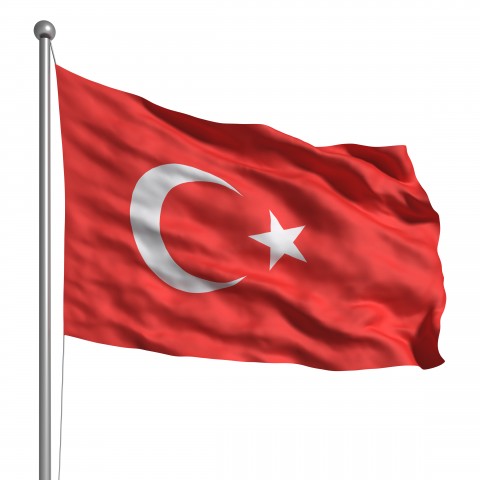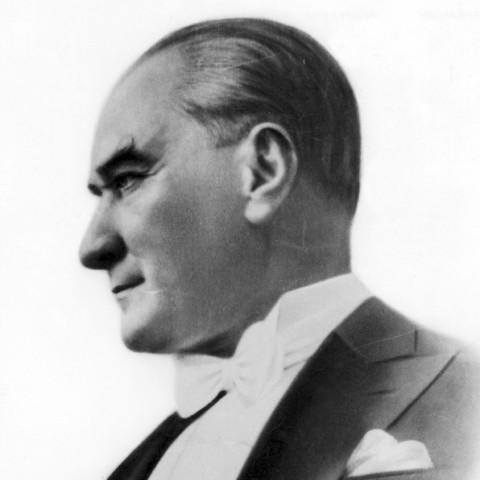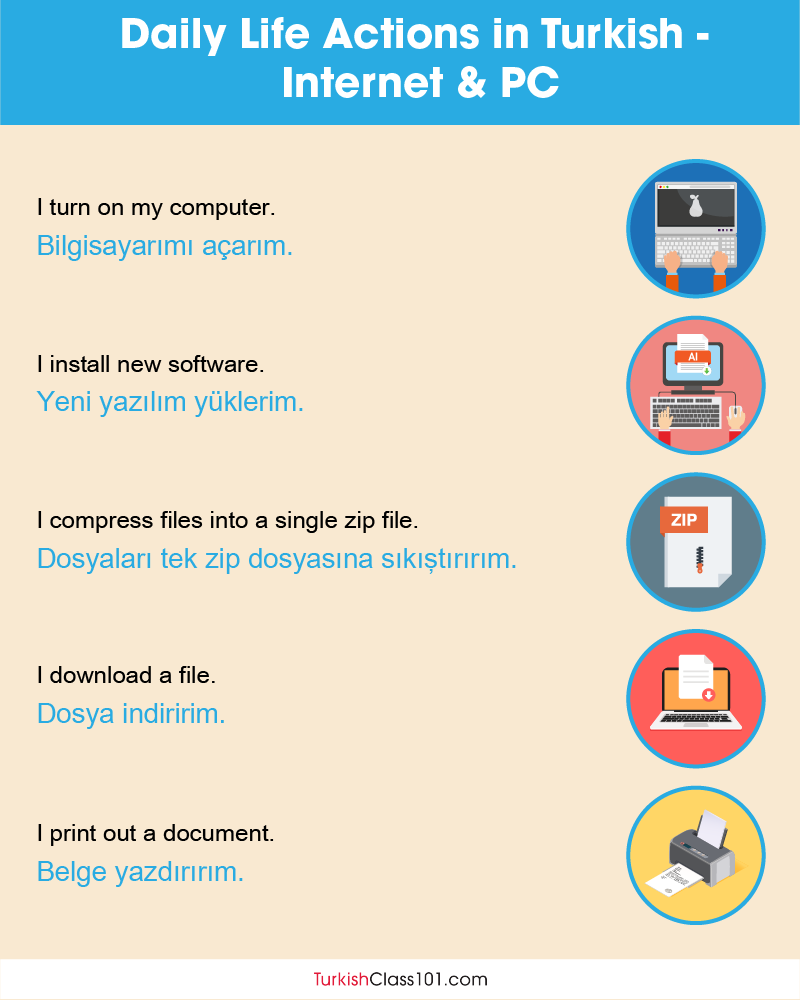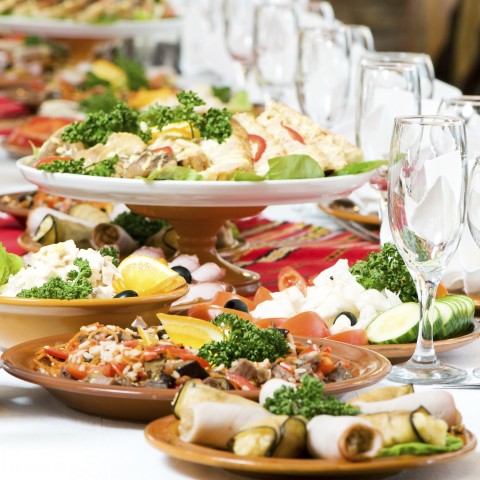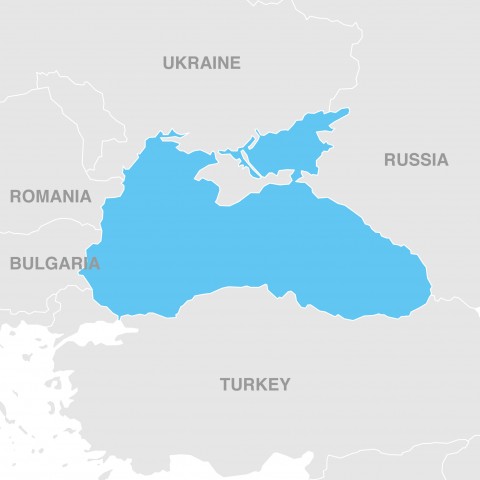
I always find traveling magical regardless of its purpose. Especially if I am going overseas. Will you also be going out of your country? Will you be traveling to Turkey? How exciting! You will end up in a new place in a few hours or the next day. You will see a place, which you haven’t seen before; which has a different lifestyle and traditions, which is full of people speaking another language. Ooops, when it comes to the language issue, you might feel uneasy. No worries. We will go over basic Turkish travel phrases in this article, so you can just concentrate on the experiences you will have and new things you will add to your own world. Who knows; maybe you will have new connections. I wish you a nice trip where you will have new, good memories you can look back at years later with a big smile.

 Table of Contents
Table of Contents
- Basic Turkish Travel Phrases
- Transportation
- Shopping
- Hotels
- Restaurants
- Asking for and giving directions
- In case of an emergency
- Phrases to overcome language barriers
- Learn More with TurkishClass101!
1. Basic Turkish Travel Phrases
1 – Greetings
Whether you are stepping into a meeting room, a hotel or a shop, or a school, a warm and sincere greeting will open the doors for you! It will help you make a good first impression and communicate effectively.
Here are some greeting words in Turkish you can use to build connection with Turkish people:
| Turkish | English |
| Merhaba | “Hello” |
| Selam | “Hi” |
| İyi günler | “Good day” |
| Günaydın | “Good morning” |
| Tünaydın | “Good afternoon” |
| İyi akşamlar | “Good evening” |
| İyi geceler | “Good night” |
| Baybay | “Bye bye” |
| Hoşçakalın | “Good-bye” |
Make sure to check this link to learn more greeting words in Turkish. You can also refer to our article if you’d like to know how you can introduce yourself in Turkish.
2 – Courtesy phrases
Kind and good words always impress people. Someone asking for help or asking a question in a kind way usually gets an answer also in a kind way. Therefore, it’s a good idea to learn these useful Turkish courtesy phrases while you are traveling.
| Turkish | English |
| Teşekkür ederim. | “Thank you.” |
| Teşekkürler. | “Thanks.” |
| Bir şey değil. / Rica ederim. | “You’re welcome.” |
| Lütfen. | “Please.” |
| Problem/sorun değil. | “No problem.” |
| Afedersiniz. | “Excuse me.” |
| Üzgünüm. | “I’m sorry.” |
3 – Likes/Dislikes
If you are in Turkey traveling, you might also need to express your likes and dislikes.
Severim/sevmem // Beğenirim/beğenmem – “I like/I don’t like”
Let’s see how we can use these Turkish words in sentences:
| Turkish | English | |
| 1 | Hayvanları çok severim. | “I like animals a lot.” |
| 2 | Acı sosları hiç sevmem. | “I don’t like hot sauces at all.” |
| 3 | Türkçe öğrenmeyi seviyorum. | “I like learning Turkish.” |
| 4 | Araba kullanmayı sevmiyorum. | “I don’t like driving.” |
| 5 | O kravatı beğenmedim. | “I didn’t like that tie.” |
2. Transportation
If you are traveling in Turkey, you will need different means of transport to get around. You might also need other information such as timetables, ticket, station, drop off point information etc.
Now, let’s take a look at some Turkish travel phrases that cover transportation:
1 – How to get to your destination
In order to get to your destination, you should know the vehicle names in Turkish.
Here they are:
| Turkish | English |
| Araba | “Car” |
| Otobüs | “Bus” |
| Uçak | “Plane” |
| Taksi/taxi | “Taxi” |
| Tren | “Train” |
| Metro | “Subway” |
| Tramvay | “Tram” |

2 – What is your destination?
Below are some phrases you can use to talk or inquire about your destination:
| Turkish | English |
| Havaalanına gitmek istiyorum. | “I’d like to go to the airport.” |
| Otobüs durağı nerede? | “Where is the bus stop?” |
| Bana bir taksi çağırabilir misiniz? | “Could you call a taxi for me?” |
| En yakın metro/tren istasyonu nerede? | “Where is the closest subway/train station?” |
| Buradan Taksim’e tramvay ile gidebilir miyim? | “Can I go to Taksim by tram from here?” |
3 – How to buy a ticket?
You should be able to ask the right questions to get a ticket. Let’s take a look at the following common Turkish phrases:
| Turkish | English |
| Gidiş bileti | “One way ticket” |
| Gidiş dönüş bileti | “Round trip ticket” |
| Nereden bilet alabilirim? | “Where can I buy a ticket?” |
| İzmir uçağı saati kaçta? | “What time is the flight to Izmir?” |
| İstanbul’a bilet ne kadar? | “How much is the ticket to Istanbul?” |
4 – Other information
A few different transport related situations are covered above. Now, let’s take a look at a few more phrases you might require as you are moving around:
| Turkish | English |
| İyi yolculuklar! | “Have a good trip!” |
| Bu otobüs Optimum alışveriş merkezinden geçer mi? | “Does this bus pass by the Optimum mall?” |
| İzmir İstanbul arası otobüsle kaç saat sürer? | “How long does it take from Izmir to Istanbul by bus?” |
| Fenerbahçe’ye gitmek için hangi otobüse binmeliyim? | “Which bus should I take to go to Fenerbahçe?” |
3. Shopping
If you are traveling, knowing some shopping vocabulary will be definitely useful. If you are going to a supermarket for a bottle of water, or to a mall to buy a raincoat, or to a shop for a souvenir, or to a drugstore for a painkiller, the following information will be handy for sure:
| Turkish | English |
| Bu kaç beden? | “What size is this?” |
| Bu ne kadar? | “How much is this?” |
| Bunu almak istiyorum. | “I’d like to buy this.” |
| Bana biraz indirim yapar mısınız? | “Can you give me a discount?” |
| Kredi kartı ile ödeyebilir miyim? | “Can I pay by credit card?” |
It’s really a good idea to know numbers in Turkish as well, if you are shopping. Make sure to read our article about numbers.
4. Hotels
Accommodation is another important factor when you are traveling. In Turkey, you can find hotels with different star ratings (from one to seven stars), pensions, vacation rentals etc. based on your budget. The following Turkish phrases for travelers relevant to accommodation will give you a relief when trying to find a place to stay.
| Turkish | English |
| Boş odanız var mı? | “Do you have an available room?” |
| Geceliği ne kadar? | “How much is it per night?” |
| Kahvaltı dahil mi? | “Is breakfast included?” |
| Kahvaltı saat kaçta? | “At what time is breakfast?” |
| Odayı kaçta boşaltmam gerekiyor? | “What time do I have to leave the room?” |
5. Restaurants
Oh, no, if you are in Turkey, you can’t just stay in a hotel room and order room service. There are so many different tastes outside the hotel. You should get out of the hotel and discover Turkish food, absolutely new tastes!
If you have not heard about Turkish cuisine, yet, make sure to read our article before you decide on a menu.
Get ready for your meal with the help of the following phrases:
| Turkish | English |
| Menüyü alabilir miyim? | “May I have the menu?” |
| Ne önerirsiniz? | “What would you recommend?” |
| Ben vejeteryanım. | “I’m a vegetarian.” |
| Süte alerjim var. | “I’m allergic to milk.” |
| Hesap lütfen! | “Check, please!” |
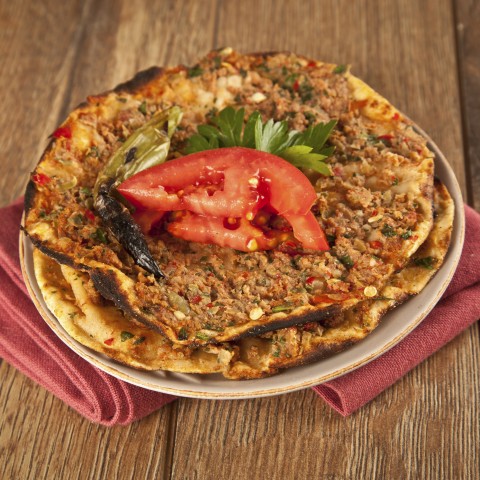
6. Asking for and giving directions
Asking directions is an inevitable part of a trip. You are in a new place and don’t know your way around. Of course, there will be times you will need directions.
Here are how you can ask where you want to go and some answers that will let you know the directions to your destination:
| Turkish | English |
| Taksim’e gitmek istiyorum. | “I’d like to go to Taksim.” |
| Taksim’e nasıl gidebilirim? | “How can I go to Taksim?” |
| Afedersiniz, kütüphane nerede? | “Excuse me, where is the library?” |
| 300 metre ileride sağda. | “It’s 300 meters ahead on the right.” |
| Düz gidin sağdan 2. sokağa dönün. | “Go straight, turn right onto 2nd street.” |
| Köşeden sola dönün, 4. bina. | “Turn left at the corner, it’s the 4th building.” |
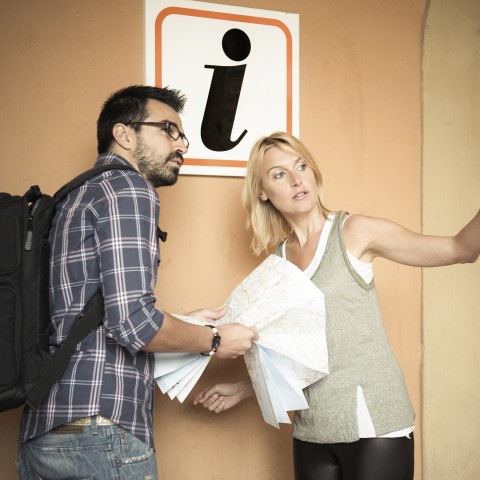
7. In case of an emergency
This is an important topic you should make a note of. None of us know what’s going to happen in the next second. We can find ourselves in a dangerous situation all of a sudden and need help. I hope you will never need to use the following, but God forbids, if any emergency comes up, you can refer to the indicated phrases:
| Turkish | English |
| Bana yardım edin lütfen! | “Help me please!” |
| Polisi arayın lütfen. | “Please call the police.” |
| Ambulans çağırın. | “Call an ambulance.” |
| Ben kayboldum. Bana yardım edebilir misiniz? | “I’m lost. Can you help me?” |
| Hastane nerede? | “Where is the hospital?” |
| Pasaportumu/cüzdanımı kaybettim. Yardıma ihtiyacım var. | “I lost my passport/wallet. I need help.” |
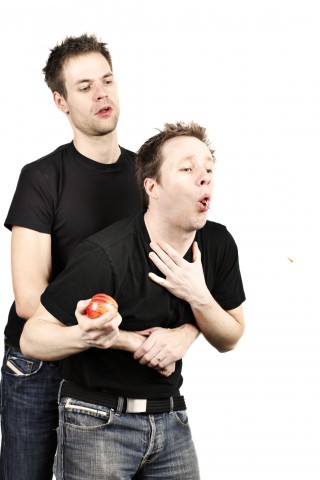
He needs help!
8. Phrases to overcome language barriers
If you are traveling to/within a foreign country, even if you have a dictionary or if you have learnt some phrases in that language, it’s very possible that there will be times when you will have difficulty expressing yourself or understanding the native speaker. Here are some Turkish phrases for tourists that can help you overcome the language barriers:
| Turkish | English |
| Anlamadım. | “I didn’t understand.” |
| İngilizce konuşuyor musunuz? | “Do you speak English?” |
| Yavaş konuşabilir misiniz lütfen? | “Can you speak slowly please?” |
| Buraya yazabilir misiniz? | “Can you write it here?” |
| Türkçe de “___” nasıl diyorsunuz? | “How do you say ‘___’ in Turkish?” |
9. Learn More with TurkishClass101!
In this article, you learned quite a number of must-know Turkish travel words and phrases. However, there are a lot more Turkish phrases for travel!
Therefore, visit TurkishClass101.com, which has numerous audio recordings, tons of vocabulary lists and free resources including the dictionary you can refer to, in order to learn basic Turkish and to get a better grasp of the culture.
Don’t forget that there is also MyTeacher, which is the premium service of TurkishClass101 that you can use to practice with a private teacher.
Do you know what is also good about it? You can download the app for free and use it wherever you are.
Last but not the least; please continue to provide us feedback about all the resources provided at TurkishClass101!

Holidays in Turkey: Atatürk Remembrance Day
Every year, the Turkish people commemorate one of the greatest leaders the country has known: Mustafa Kemal Ataturk. In this article, you’ll learn about how Turkey honors Ataturk’s memory, and explore some of Ataturk’s contributions to Turkey—and the world. In short, you’ll gain a clear picture of what the Turkish people remember Ataturk for, and why it’s significant.
As any successful language-learner can tell you, understanding a country’s culture is a step you can’t miss!
At TurkishClass101.com, we hope to make every aspect of your language-learning journey both fun and informative! Let’s get started, and delve into this Turkish national holiday.

1. What is Atatürk Remembrance Day?
Mustafa Kemal Atatürk passed away of cirrhosis on November 10, 1938, at 09:05 in Dolmabahçe Palace. His casket, draped in a flag, was placed on a catafalque for a moment, while residents of Istanbul mourned deeply. Following the funeral prayer and cortege, during his mausoleum’s construction, Atatürk rested in a marble tomb in the Ethnography Museum of Ankara for fifteen years. After the completion of Anıtkabir, his casket was transferred to his final resting place.
Mustafa Kemal Atatürk was not only an extraordinary leader and a revolutionary officer, who advocated peace, democracy, secularism, basic rights, and freedom, but he was also an academic research enthusiast. Even though today he might be considered to be ultra-nationalistic by some, he has always been admired and respected internationally as a leader, for his long-sightedness, ideas, and military achievements. One of his most famous sayings summarizes his ideas: “Peace at home, peace in the world.”
Mustafa Kemal was granted his surname, which is the combination of the words “father” and “Turk,” by the parliament right after the surname law in 1934.
2. When is Ataturk Commemoration Day?
Turks celebrate Ataturk Remembrance Day each year on November 10, the date of this beloved figure’s death.
3. Ataturk Memorial Day Traditions & Celebrations
Every year on November 10 at exactly 09:05, sirens sound throughout the country. All traffic stops, drivers and travelers get out of their vehicles, and people in their offices take a break and stand up. In schools, students will already be expecting this time and join the rest of the country.
Life stops at this time, and while the sirens wail, everybody in the country stands up as a gesture of respect. Following the sirens, in schools and government agencies, people sing the National Anthem.
4. Six Important Ataturk Principles
Can you name the six principles of Atatürk’s that have affected recent Turkish history?
These principles are:
- Republicanism
- Populism
- Secularism
- Reformism
- Nationalism
- Statism
5. Must-Know Vocabulary for Ataturk Remembrance Day
Here’s some essential vocabulary for Ataturk Remembrance Day!
- Mustafa Kemal Atatürk — “Mustafa Kemal Ataturk”
- Türk Bayrağı — “Turkish flag”
- Anıtkabir’e çelenk koymak — “Place a wreath on the Mausoleum of Ataturk”
- Yas tutma — “Mourning”
- Saygı duruşu — “Moment of silence”
- Askeri geçit — “Military parade”
- Bayrak asmak — “Fly a flag”
- Bayrak sallama — “Flag-waving”
- Anma töreni — “Commemorative ceremony”
- Atatürk büstü — “Bust of Ataturk”
- Atatürk rozeti — “Ataturk badge”
- İstiklal Marşı — “Turkish National Anthem”
- Anıtkabir — “The Mausoleum of Ataturk”
To hear the pronunciation of each word, and to see them accompanied by relevant images, visit our Ataturk Remembrance Day vocabulary list!
Final Thoughts
We hope you enjoyed learning about this Turkish national holiday with us!
Did you learn anything new? Does your country have a similar holiday celebrating a beloved historical figure? Let us know in the comments! We always look forward to hearing from you!
Being able to discover a country’s culture may be the most rewarding and exciting aspect of trying to master its language. If more cultural information is what you’re after, be sure to check out the following pages on TurkishClass101.com:
- After Ramadan: The Turkish Feast of Sacrifice
- Tourist Attractions in Turkey
- Turkish Pop & Traditional Culture
- 4 Reasons Why Turkish Slang Words Will Make You Fluent
- Top 20 Words You’ll Need for the Internet
For even more Turkish learning opportunities, be sure to create a free basic account today! By upgrading to Premium Plus, you can further accelerate your learning with your own personal Turkish tutor. You really can master the language, and we’ll be here with constant support and effective learning materials every step of the way!
Happy Turkish learning!

Let’s Learn Turkish Numbers

Can you imagine carrying out a conversation in a foreign language without knowing the numbers in that language? I seriously can’t! We deal with numbers in every aspect of our lives. They are not only used in counting, but also when telling the date and the time, dimensions, weight, temperature, distances, prices, your age, phone number, address, and even blood pressure. In short, since they have a wide range of usage from math to history, geography to science, medicine to seismology, it’s impossible to have proper conversations without knowing numbers!
Are you ready to learnTurkish numbers and their usage?

 Table of Contents
Table of Contents
- Basic vocabulary related to numbers
- How to count from 0 to 9?
- How to count from 10 to 100
- Numbers up to Thousand and Beyond
- How to say your age
- How to give your phone number
- How to use numbers when saying prices
- How to use numbers when shopping
- Other usages of numbers
- Discover More About the Turkish Language on TurkishClass101.com
1. Basic vocabulary related to numbers
Let’s start with some vocabulary related to numbers and then we can count and see how Turkish numbers are used in different areas.
| Turkish | English |
| Sayı/Sayılar | Number/Numbers |
| Tam sayılar | Whole numbers |
| Kesirli sayılar | Rational numbers |
| Sıra sayısı | Ordinal number |
| Ondalık sayı | Decimal number |
| Basamak | Digit |
| Pi sayısı | Pi |
| Tam | Whole |
| Yarım/Buçuk | Half |
| Çeyrek | Quarter |
| Saymak | To count |
| Hesaplamak | To calculate |
| Kaça/Kaç para/Ne kadar? | How much? |
| Kaç/Kaç tane? | How many? |
2. How to count from 0 to 9?
| Number | Turkish |
| 0 | Sıfır |
| 1 | Bir |
| 2 | İki |
| 3 | Üç |
| 4 | Dört |
| 5 | Beş |
| 6 | Altı |
| 7 | Yedi |
| 8 | Sekiz |
| 9 | Dokuz |
In Turkish, when a noun is preceded by a number greater than one, the noun does not take the plural suffix, -lar or -ler. Instead, it retains its singular form because the number indicates that it’s plural.
Example:
- Bıçak – “Knife”
- Bir bıçak – “One knife”
- Yedi bıçak – “Seven knives”
3. How to count from 10 to 100
A- Teens
| Number | Turkish |
| 11 | On bir |
| 12 | On iki |
| 13 | On üç |
| 14 | On dört |
| 15 | On beş |
| 16 | On altı |
| 17 | On yedi |
| 18 | On sekiz |
| 19 | On dokuz |
B- Tens
| Number | Turkish |
| 10 | On |
| 20 | Yirmi |
| 30 | Otuz |
| 40 | Kırk |
| 50 | Elli |
| 60 | Altmış |
| 70 | Yetmiş |
| 80 | Seksen |
| 90 | Doksan |
Let’s take a look at some examples:
· 12: On iki
· 21: Yirmi bir
· 34: Otuz dört
· 43: Kırk üç
· 56: Elli altı
· 65: Altmış beş
· 78: Yetmiş sekiz
· 87: Seksen yedi
· 99: Doksan dokuz
4. Numbers up to Thousand and Beyond
Now that you learned the Turkish numbers 1-100, let’s continue with larger numbers.
A- Hundreds
In Turkish, if the 3-digit number starts with a “one”, you never say “one hundred”; you just say “yüz”, meaning “hundred.” To form the numbers from 200 to 900, all you need to do is to place a number from 2-9 in front of the word “yüz”, which is “hundred” in English.
| Number | Turkish |
| 100 | Yüz |
| 200 | İki yüz |
| 300 | Üç yüz |
| 400 | Dört yüz |
| 500 | Beş yüz |
| 600 | Altı yüz |
| 700 | Yedi yüz |
| 800 | Sekiz yüz |
| 900 | Dokuz yüz |
Here are some examples for you:
· 127: Yüz yirmi yedi
· 256: İki yüz elli altı
· 334: Üç yüz otuz dört
· 468: Dört yüz altmış sekiz
· 541: Beş yüz kırk bir
· 679: Altı yüz yetmiş dokuz
· 715: Yedi yüz on beş
· 893: Sekiz yüz doksan üç
· 922: Dokuz yüz yirmi iki
B- Thousands
The thousands work the same way. In Turkish, if the 4-digit number starts with a “one”, you never say “one thousand”; you just say “bin”, meaning “thousand.” To form the numbers from two thousand to nine thousand, all you need to do is to place a number from 2-9 in front of the word “bin”, which is “thousand” in English.
Please also note that whole numbers are separated with a “dot” and decimal numbers with a “comma” in Turkish.
Examples:
· 1.000 – Bin (“1,000 – One thousand”)
· 1,50 – Bir buçuk (“1.5 – One point five”)
Numbers in Turkish | Turkish |
| 1.000 | Bin |
| 2.000 | İki bin |
| 3.000 | Üç bin |
| 4.000 | Dört bin |
| 5.000 | Beş bin |
| 6.000 | Altı bin |
| 7.000 | Yedi bin |
| 8.000 | Sekiz bin |
| 9.000 | Dokuz bin |
Below are some examples:
· 1561: Bin beş yüz altmış bir
· 2352: İki bin üç yüz elli iki
· 3843: Üç bin sekiz yüz kırk üç
· 4124: Dört bin yüz yirmi dört
· 5675: Beş bin altı yüz yetmiş beş
· 6496: Altı bin dört yüz doksan altı
· 7787: Yedi bin yedi yüz seksen yedi
· 8938: Sekiz bin dokuz yüz otuz sekiz
· 9019: Dokuz bin on dokuz
C- Beyond One Thousand
Here are some numbers with many zeros:
Numbers in Turkish | Turkish |
| 10.000 | On bin |
| 100.000 | Yüz bin |
| 1.000.000 | Bir milyon |
| 1.000.000.000 | Bir milyar |
| 1.000.000.000.000 | Bir trilyon |
| 1.000.000.000.000.000 | Bir katrilyon |
5. How to say your age
Saying your age is one of the basic information you provide when you introduce yourself.
As in some other countries, it is considered as private and sensitive information by some women in Turkey. Therefore, I recommend you to be careful when asking women about their ages in Turkey.
Q: Kaç yaşındasınız? (“How old are you?”) (Formal)
A: Kırk bir yaşındayım. (“I’m forty-one years old.”) (Literally: I’m in the age of forty-one.)
Q: Kaç yaşındasın? (“How old are you?”) (Informal)
A: Kaç gösteriyorum? (“How old do I look?”)
Q: Otuz altı. (“Thirty-six.”)
A: Teşekkürler, aslında elli yaşındayım. (“Thanks, actually I am fifty years old.”)

6. How to give your phone number
When you dial a phone number within Turkey, you first dial a “zero” and then either the 3-digit code of the city if you are calling a landline or the 3-digit code of the mobile phone provider. Then you dial the 7-digit number. If you are trying to call a Turkish number out of Turkey, then you should first dial the country code,”90” for Turkey and then the whole number (10 digits) without dialing the “0.”
Ex:
0-532-777-77 77 (Within Turkey)
90-532-777-77 77 (Outside of Turkey)
Formal ways of asking a phone number:
· Telefon numaranızı alabilir miyim? (“May I have your phone number?”)
· Telefon numaranızı sorabilir miyim? (“May I ask your phone number?”)
· Telefon numaranızı verebilir misiniz? (“Can you give your phone number?”)
· Telefon numaranızı söyleyebilir misiniz? (“Can you tell your phone number?”)
Let’s say our mobile number is: 0-532- 395- 56 56
Some people will say the zero, some won’t. Here are the two ways you can read it:
· Sıfır, beş yüz otuz iki, üç yüz doksan beş elli altı elli altı. (“Zero, five hundred thirty two, three hundred ninety five, fifty six, fifty six.”)
· Beş yüz otuz iki, üç yüz doksan beş elli altı elli altı. (“Five hundred thirty two, three hundred ninety five, fifty six, fifty six.”)
Informal ways of asking a phone number:
· Cep numaran kaç? (“What is your mobile number?”)
· Telefon/cep numaranı alabilir miyim? (“May I have your phone/mobile number?”)
· Telefon/cep numaranı sorabilir miyim? (“May I ask your phone/mobile number?”)
· Telefon/cep numaranı verebilir misin? (“Can you give your phone/mobile number?”)
· Telefon/cep numaranı söyler misin? (“Can you tell your phone/mobile number?”)
Let’s say our mobile number is: 0-542-666-66 66
Here are the two ways you can read it:
· Sıfır, beş yüz kırk iki, altı yüz altmış altı, altmış altı, altmış altı. (“Zero, five hundred forty-two, six hundred sixty six, sixty six, sixty six.”)
· Beş yüz kırk iki, altı yüz altmış altı, altmış altı, altmış altı. (“Five hundred forty-two, six hundred sixty six, sixty six, sixty six.”)

You can click here to check Turkish phone words and phrases.
7. How to use numbers when saying prices
If you are living in Turkey or visiting Turkey, in any case, you will be buying something; be it a pack of gum or a gift for your beloved one. Let’s see how you can use Turkish numbers when talking about prices.
Q: Bu elbise ne kadar? (“How much is this dress?”)
A: İki yüz kırk lira. (“Two hundred forty liras.”)
Q: İki yüz lira olur mu? (“Would it be two hundred liras?”)
A: Maalesef olmaz. (“Unfortunately, no.”)
As you may guess from the example, you might try negotiating in some stores in Turkey.
Q: Peynirin kilosu ne kadar? (“How much is a kilo of cheese?”)
A:Seksen beş lira elli kuruş. (“Eighty-five lira fifty cents.”)

8. How to use numbers when shopping
Below are some examples that will show you how you can use Turkish numbers as quantities when shopping:
· Bir kutu süt istiyorum. (“I’d like a box of milk.”)
· İki yüz elli gram peynir almak istiyorum. (“I’d like to buy 250 grams of cheese.”)
· Yarım kg et alacağım. (“I will buy half a kilo of meat.”)
· İki şişe su rica edeyim. (“Two bottles of water, please.”)
· Beş paket sigara istiyorum. (“I’d like five packs of cigarrettes.”)
9. Other usages of numbers
Now, let’s see how else we can use numbers:
A- Percentage
In Turkish, the way percentages are written and read are different than English. Percentage sign is written and read before the number. Here are some examples:
· %50 – Yüzde elli (“50% -“Fifty percent”)
· %82 – Yüzde seksen iki (“82% – “Eighty two”)
B- Weather
Turkey uses Celsius scale. Only the degree is pronounced. Celsius is not mentioned when talking about the degrees.
· Bugün hava kaç derece? (“What is the temperature today?”)
· 30o – Otuz derece (“Thirty degrees”)
C- Dimensions
Turkey uses the metric system and below is an example showing how to say dimensions in Turkish:
· En otuz cm, boy elli iki cm, yükseklik otuz dört cm. (“Width thirty cm, length fifty-two cm, height thirty four cm.”)
D- Weight
Here are some examples for your reference:”
· 70,5 kg – Yetmiş buçuk kg (“70.5 kg”)
· 1200 gr – Bin iki yüz gr (“1200 gr”)
· 136,5 ton – Yüz otuz altı buçuk ton (“136.5 tons”)
I’d like to point out once again that commas are used to show the decimal places in Turkish.

10. Discover More About the Turkish Language on TurkishClass101.com
You’ve now learnt a lot about Turkish numbers, the Turkish number system, and the Turkish numbers’ pronunciation. You have also learnt how to count Turkish numbers 1-1000 and how to use them in different cases.
Best way to learn Turkish numbers in-depth is to check TurkishClass101, which has numerous audio recordings, tons of vocabulary lists and free resources including the dictionary you can refer to, in order to get a better grasp of Turkish language and the culture.
Don’t forget that there is also MyTeacher, which is the premium service of TurkishClass101 that you can use to practice 1-on-1 with a private teacher.
Do you know what is also good about it? You can download the app for free and use it wherever you are.
Last but not the least; please continue to provide us feedback about all the resources provided at TurkishClass101!

How To Post In Perfect Turkish on Social Media
You’re learning to speak Turkish, and it’s going well. Your confidence is growing! So much so that you feel ready to share your experiences on social media—in Turkish.
At Learn Turkish, we make this easy for you to get it right the first time. Post like a boss with these phrases and guidelines, and get to practice your Turkish in the process.
 [public_ui]
[public_ui]
1. Talking about Your Restaurant Visit in Turkish
Eating out is fun, and often an experience you’d like to share. Take a pic, and start a conversation on social media in Turkish. Your friend will be amazed by your language skills…and perhaps your taste in restaurants!
Barış eats at a restaurant with his friends, posts an image of the group, and leaves this comment:
POST
Let’s break down Barış’s post.
Arkadaşlarla rakı-balık keyfi.
“Raki and fish feast with friends.”
1- arkadaşlarla
First is an expression meaning “with friends.”
The first word means “friends” and the suffix -la at the end means “with.”
2- rakı-balık keyfi
Then comes the phrase – “raki and fish feast.”
“Rakı-balık” is a very common expression. Rakı is a popular alcoholic drink in Turkey and other Balkan countries. It is a Turkish national drink and is usually consumed with fish and small side dishes called meze. “Keyif” means pleasure, and it is one of the most common expressions on Turkish social media. For example, “kahve keyfi” (coffee pleasure), “alışveriş keyfi” (shopping pleasure). When “keyif” is used in a noun compound, as in this case, it takes the suffix -i, and as a rule the “i” inside “keyif” drops. “Rakı-balık” + “keyif” becomes “rakı-balık keyfi”.
COMMENTS
In response, Barış’s friends leave some comments.
1- Afiyet olsun canım.
His neighbor, Zeynep, uses an expression meaning – “Bon appetit, dear.”
This is a well-known loan-expression from French that means “Eat well”. Use it with a term of endearment to show friendly affection.
2- Bizi çağırmak yok mu?
His college friend, Can, uses an expression meaning – “You are not inviting us?”
Use this expression if you are feeling left out.
3- Çok lezzetli görünüyor.
His girlfriend’s high school, Seda, uses an expression meaning – “It looks very delicious.”
Use this expression to agree with the poster.
4- Afiyet olsun. Cansu Hanım’a selamlar.
His supervisor, Orhan, uses an expression meaning – “Bon appetit. Give my regards to Ms. Cansu.”
Again, the French loan-expression, together with a formal greeting.
VOCABULARY
Find below the key vocabulary for this lesson:
So, let’s practice a bit. If a friend posted something about having dinner with friends, which phrase would you use?
Now go visit a Turkish restaurant, and wow the staff with your language skills!
2. Post about Your Mall Visit in Turkish
Another super topic for social media is shopping—everybody does it, most everybody loves it, and your friends on social media are probably curious about your shopping sprees! Share these Turkish phrases in posts when you visit a mall.
Cansu shop with her sister at the mall, posts an image of the two of them, and leaves this comment:
POST
Let’s break down Cansu’s post.
Abla-kardeş alışverişteyiz.
“The sisters have gone shopping.”
1- abla-kardeş
First is an expression meaning “elder sister – younger sibling”.
Abla means “elder sister” and kardeş means “sibling”. Since it doesn’t give a hint about the gender of the younger sibling, this expression can be used for elder sisters and brothers, too. In our case it’s two sisters.
2- alışverişteyiz
Then comes the phrase – “We have gone shopping.”
“Alışveriş” means “shopping” and “alışverişte” means “during shopping.” There’s “-yiz” at the end is the suffix for first person plural with buffer consonant “y”. Note that the vowels in suffixes may change according to Turkish vowel harmony rules.
COMMENTS
In response, Cansu’s friends leave some comments.
1- Eyvah!
Her boyfriend, Barış, uses an expression meaning – “Oh, no!”
Use this expression to joke a bit with the poster.
2- Bir dahaki sefere beni de çağırın.
Her high school friend, Seda, uses an expression meaning – “Next time, call me, too.”
Use this expression if you wish to be included in the poster’s plans.
3- İyi alışverişler.
Her neighbor, Zeynep, uses an expression meaning – “Happy shopping.”
Use this expression if you are feeling warmhearted.
4- Hangi AVM?
Her boyfriend’s college friend, Can, uses an expression meaning – “Which mall?”
Use this question if you want more information.
VOCABULARY
Find below the key vocabulary for this lesson:
So, if a friend posted something about going shopping, which phrase would you use?
3. Talking about a Sport Day in Turkish
Sports events, whether you’re the spectator or the sports person, offer fantastic opportunity for great social media posts. Learn some handy phrases and vocabulary to start a sport-on-the-beach conversation in Turkish.
Barış plays with his friends at the beach, posts an image of the team, and leaves this comment:
POST
Let’s break down Barış’s post.
Açık havada spor yapmak gibisi yok!
“Nothing compares to doing outdoor sports!”
1- Açık havada spor yapmak
First is an expression meaning “to do outdoor sports”.
In Turkey people generally love outdoor activities.
2- gibisi yok
Then comes the phrase – “nothing compares to.”
This is a very common expression. You can combine it with your hobbies or the things you like. Just make sure the first part is either a noun or a verb in dictionary form, ending with -mek or -mak.
COMMENTS
In response, Barış’s friends leave some comments.
1- Barış Abi, formdan düşmüşsün.
His girlfriend’s nephew, Berke, uses an expression meaning – “Barış, you’re out of shape.”
Use this expression to joke with and tease the poster.
2- Ne güzel bronzlaşmışsınız.
His neighbor, Zeynep, uses an expression meaning – “You’ve got a nice tan.”
Use this expression to compliment the poster.
3- Bakıyorum keyifler yerinde.
His girlfriend’s high school friend, Seda, uses an expression meaning – “As far as I can see, you’re having a good time.”
Use this expression to make casual conversation.
4- Keyifli tatiller!
His supervisor, Orhan, uses an expression meaning – “Have an enjoyable holiday!”
This is a slightly formal well-wish.
VOCABULARY
Find below the key vocabulary for this lesson:
Which phrase would you use if a friend posted something about sports?
But sport is not the only thing you can play! Play some music, and share it on social media.
4. Share a Song on Social Media in Turkish
Music is the language of the soul, they say. So, don’t hold back—share what touches your soul with your friends!
Cansu shares a song she just heard at a party, posts an image of the artist, and leaves this comment:
POST
Let’s break down Cansu’s post.
Güne enerjik başlamak için harika bir şarkı.
“A great song to start your day with energy.”
1- Güne enerjik başlamak için
First is an expression meaning “to start the day.”
In Turkey being energetic is a very desirable trait. Recipes and tips on how to have more energy often show up on TV and newspapers.
2- harika bir şarkı
Then comes the phrase – “a great song.”
In most cases, “bir,” which corresponds to the article “a” in English, comes between the adjective and its noun.
COMMENTS
In response, Cansu’s friends leave some comments.
1- Bomba.
Her boyfriend’s college friend, Can, uses an expression meaning – “It’s the bomb.”
Use this expression as a strong agreement.
2- İzninle çalıyorum canım.
Her high school friend, Seda, uses an expression meaning – “If you’ll excuse me, I’m stealing your post, dear.”
Use this expression if you wish to share the post.
3- Grubun adı ne?
Her friend, Selin, uses an expression meaning – “What’s the name of the band?”
Use this expression to get more information.
4- Çok enerjik.
Her neighbor, Zeynep, uses an expression meaning – “Very energetic.”
Use this expression to show you are feeling warmhearted.
VOCABULARY
Find below the key vocabulary for this lesson:
Which song would you share? And what would you say to a friend who posted something about sharing music or videos?
Now you know how to start a conversation about a song or a video on social media!
5. Turkish Social Media Comments about a Concert
Still on the theme of music—visiting live concerts and shows just have to be shared with your friends. Here are some handy phrases and vocab to wow your followers in Turkish!
Barış goes to a concert, posts an image of it, and leaves this comment:
POST
Let’s break down Barış’s post.
Bu grup bir harika!
“This band is a wonder!”
1- Bu grup
First is an expression meaning “This band”.
There are six demonstratives in Turkish: Bu=This, Şu=That (nearby), O=That (over there), Bunlar=These, Şunlar=Those (nearby), and Onlar=Those (over there).
2- bir harika
Then comes the phrase – “is a wonder.”
Even though “harika” is usually used as an adjective, it can also be a noun. Saying “bir harika” instead of “harika” gives the expression a touch of humor.
COMMENTS
In response, Barış’s friends leave some comments.
1- Ben de çok severim.
His neighbor, Zeynep, uses an expression meaning – “I love them, too.”
Use this expression to show you are in warm agreement.
2- Canlı performansları çok iyidir.
His girlfriend’s nephew, Berke, uses an expression meaning – “Their live performances are great.”
Another expression of agreement.
3- Yine bensiz mi eğleniyorsunuz?
His college friend, Can, uses an expression meaning – “Are you having fun without me again?”
Use this expression if you’re feeling excluded.
4- Müzik ruhun gıdasıdır.
His supervisor, Orhan, uses an expression meaning – “Music is food for the soul.”
Use this expression to share a personal opinion in a slightly formal way.
VOCABULARY
Find below the key vocabulary for this lesson:
If a friend posted something about a concert, which phrase would you use?
6. Talking about an Unfortunate Accident in Turkish
Oh dear. You broke something by accident. Use these Turkish phrases to start a thread on social media. Or maybe just to let your friends know why you are not contacting them!
Cansu accidentally breaks her mobile phone, and leaves this comment:
POST
Let’s break down Cansu’s post.
Allah kahretsin telefonumu kırdım!
“Dang it! I broke my phone!”
1- Allah kahretsin
First is an expression meaning “Dang it.”
It can also be used as “kahretsin”, which has a similar meaning to “dang it”.
2- telefonumu kırdım
Then comes the phrase – “I broke my phone.”
The word “telefonum” (my phone) takes the suffix -u because it’s in the accusative case.
COMMENTS
In response, Cansu’s friends leave some comments.
1- Geçmiş olsun.
Her supervisor, Orhan, uses an expression meaning – “I hope the trouble is (already) over.”
Use this expression to show support.
2- Nasıl becerdin?
Her nephew, Berke, uses an expression meaning – “How did you manage that?”
Use this question if you wish to get more information.
3- Takma. Olur öyle.
Her boyfriend’s college friend, Can, uses an expression meaning – “Don’t worry. It happens.”
Use this expression if you wish to be supportive.
4- Üstüne bir bardak soğuk su iç.
Her high school friend, Seda, uses an expression meaning – “Drink a glass of cold water after what happened.”
Use this expression to give advice.
VOCABULARY
Find below the key vocabulary for this lesson:
If a friend posted something about having broken something by accident, which phrase would you use?
So, now you know how to describe an accident in Turkish. Well done!
7. Chat about Your Boredom on Social Media in Turkish
Sometimes, we’re just bored with how life goes. And to alleviate the boredom, we write about it on social media. Add some excitement to your posts by addressing your friends and followers in Turkish!
Barış gets bored at home, and leaves this comment:
POST
Let’s break down Barış’s post.
Sıkıntıdan patlamak üzereyim.
“I’m so bored.”
1- sıkıntıdan patlamak
First is an expression meaning “to explode because of boredom.”
It’s a very common expression and a slightly childish way of saying you’re bored.
2- üzereyim
Then comes the phrase – “I am about to.”
In this sentence “üzere” means “about to.” You can use this after any verb in the dictionary (-mek, -mak) form.
COMMENTS
In response, Barış’s friends leave some comments.
1- Ben de.
His girlfriend’s nephew, Berke, uses an expression meaning – “Me too.”
Use this expression to show your agreement.
2- Kanka, gel dışarı çıkalım.
His college friend, Can, uses an expression meaning – “Bro, let’s go out.”
Use this expression to make plans with the poster.
3- Aşkım, çok sıkıldıysan çamaşırları yıkasana.
His girlfriend, Cansu, uses an expression meaning – “Darling, if you’re so bored, why don’t you do the laundry.”
Use this expression either to tease your beloved, or perhaps you’re serious?!
4- Kanal 2’de çok güzel bir belgesel var. Tavsiye ederim.
His supervisor, Orhan, uses an expression meaning – “There is a very good documentary on Channel 2. I recommend that.”
Use this expression to give advice.
VOCABULARY
Find below the key vocabulary for this lesson:
If a friend posted something about being bored, which phrase would you use?
Still bored? Share another feeling and see if you can start a conversation!
8. Exhausted? Share It on Social Media in Turkish
Sitting in public transport after work, feeling like chatting online? Well, converse in Turkish about how you feel, and let your friends join in!
Cansu feels exhausted after a long day at work, posts an image of herself looking tired, and leaves this comment:
POST
Let’s break down Cansu’s post.
Bugün işte canım çıktı. Tatile ihtiyacım var.
“Today, I worked myself to death. I need a holiday.”
1- Bugün işte canım çıktı.
First is an expression meaning “Today, I worked myself to death.”
“Can” is believed to be the life force inside a body. It is also a popular male name in Turkey. “Canı çıkmak” means “life force escaping the body”; it’s a synonym for death. Turkish people use this expression to overstate their exhaustion.
2- Tatile ihtiyacım var.
Then comes the phrase – “I need a holiday.”
Turkey has more official holidays than many other countries. But compared to other OECD countries, working people in Turkey have less days off in total and work more overtime. So it’s difficult to have a vacation in Turkey unless it’s one of the official holidays.
COMMENTS
In response, Cansu’s friends leave some comments.
1- Yazık sana!
Her high school friend, Seda, uses an expression meaning – “Poor thing!”
Use this expression to be sympathetic.
2- Bir fincan bitki çayı iyi gelir.
Her neighbor, Zeynep, uses an expression meaning – “A cup of herbal tea would help.”
Use this expression to give advice.
3- Hayat zor.
Her nephew, Berke, uses an expression meaning – “Life is tough.”
Use this expression to be humorous by using a philosophical statement.
4- Bu akşam yemeği Barış hazırlıyor anlaşılan.
Her boyfriend’s college friend, Can, uses an expression meaning – “It looks like Barış will do the cooking tonight.”
Use this expression if you are feeling frivolous.
VOCABULARY
Find below the key vocabulary for this lesson:
If a friend posted something about being exhausted, which phrase would you use?
Now you know how to say you’re exhausted in Turkish! Well done.
9. Talking about an Injury in Turkish
So life happens, and you manage to hurt yourself during a soccer game. Very Tweet-worthy! Here’s how to do it in Turkish.
Barış suffers a painful ankle injury, posts an image of it, and leaves this comment:
POST
Let’s break down Barış’s post.
Spor salonunda bileğimi burktum. Davul gibi şişti.
“I sprained my ankle at the gym. It’s swollen like a drum.”
1- Spor salonunda bileğimi burktum.
First is an expression meaning “I sprained my ankle at the gym..”
Nowadays, going to the gym is a popular activity among white collar workers.
2- Davul gibi şişti.
Then comes the phrase – “It’s swollen like a drum..”
In Turkish a drum is generally used as a comparison for swollen body parts.
COMMENTS
In response, Barış’s friends leave some comments.
1- Of çok fena görünüyor.
His neighbor, Zeynep, uses an expression meaning – “Oh, it looks very bad.”
Use this expression if you are feeling very sympathetic.
2- Geçmiş olsun. Doktora gittin mi?
His supervisor, Orhan, uses an expression meaning – “Get well soon. Did you go to the doctor?”
This is a well-wish, as well as a question. The phrases express concern.
3- Kafam kadar olmuş.
His girlfriend’s high school friend, Seda, uses an expression meaning – “It’s almost as big as my head.”
Use this expression to give a personal opinion about the injury.
4- Spor salonuna gitmek kim, sen kim.
His girlfriend’s nephew, Berke, uses an expression meaning – “Going to the gym and you are not a good match.”
This is another personal opinion.
VOCABULARY
Find below the key vocabulary for this lesson:
If a friend posted something about being injured, which phrase would you use?
We love to share our fortunes and misfortunes; somehow that makes us feel connected to others.
10. Starting a Conversation Feeling Disappointed in Turkish
Sometimes things don’t go the way we planned. Share your disappointment about this with your friends!
Cansu feels disappointed about today’s weather, posts an image of it, and leaves this comment:
POST
Let’s break down Cansu’s post.
Pazar olmasına rağmen yağmur yüzünden evde kapalı kaldık.
“Even though it’s Sunday, because of the rain, we’re locked up inside the house.”
1- pazar olmasına rağmen
First is an expression meaning “Even though it’s Sunday.”
The first word means “Sunday,” and the third word means “even though.” In between them is the helping verb meaning “to be”.
2- yağmur yüzünden evde kapalı kaldık
Then comes the phrase – “because of the rain we are locked up inside the house.”
In Turkey, winter is the rainy season, so in spring and summer weekend plans are not usually ruined because of bad weather.
COMMENTS
In response, Cansu’s friends leave some comments.
1- Gerçekten çok can sıkıcı.
Her high school friend, Seda, uses an expression meaning – “It’s really annoying.”
Use this expression to be in agreement.
2- Üstelik arabayı da daha geçen gün yıkatmıştım.
Her boyfriend’s college friend, Can, uses an expression meaning – “On top of that, I just washed my car the other day.”
Use this expression to share a personal experience. It’s a good way to keep the conversation going.
3- Kuraklık olmasından iyidir.
Her friend, Selin, uses an expression meaning – “It’s better than a drought.”
Use this expression to offer a differing opinion.
4- Bugün için bir programınız mı vardı?
Her neighbor, Zeynep, uses an expression meaning – “Did you have plans for today?”
Use this question to show your interest.
VOCABULARY
Find below the key vocabulary for this lesson:
How would you comment in Turkish when a friend is disappointed?
Not all posts need to be about a negative feeling, though!
11. Talking about Your Relationship Status in Turkish
Don’t just change your relationship status in Settings, talk about it!
Barış changes his status to “In a relationship”, posts an image of him and Cansu, and leaves this comment:
POST
Let’s break down Barış’s post.
Hayatımın kadınını buldum, mutluyum.
“I found the woman of my life. I’m happy.”
1- Hayatımın kadınını buldum
First is an expression meaning “I have found the woman of my life.”
“Hayatımın kadını” is a defined compound noun meaning “the woman of my life”. In this kind of compound noun, the first noun takes the suffix -ın, and the second noun takes the third person singular possessive suffix -ı. On top of that, the noun compound takes another suffix (-nı) to form the accusative case.
2- mutluyum
Then comes the phrase – “I’m happy.”
In Turkey people usually change their relationship status without making any comment, but friends and relatives rush to make comments under the post and ask questions.
COMMENTS
In response, Barış’s friends leave some comments.
1- Beni yengeyle ne zaman tanıştıracaksın?
His college friend, Can, uses an expression meaning – “When will you introduce me to her?”
Use this question if you are curious.
2- Ne zamandan beri?
His friend, Selin, uses an expression meaning – “Since when?”
Ask this question if you want more information.
3- Bu şanslı kadın kim?
His supervisor, Orhan, uses an expression meaning – “Who’s the lucky lady?”
This is a slightly formal question to get more information.
4- İnanmıyorum! Senin adına çok sevindim
His neighbor, Zeynep, uses an expression meaning – “I don’t believe it! I’m so happy for you.”
Use this expression if you are feeling warmhearted and pleased.
VOCABULARY
Find below the key vocabulary for this lesson:
What would you say in Turkish when a friend changes their relationship status?
Being in a good relationship with someone special is good news – don’t be shy to spread it!
12. Post about Getting Married in Turkish
Wow, so things got serious, and you’re getting married. Congratulations! Or, your friend is getting married, so talk about this in Turkish.
Cansu is getting married today, so she eaves this comment:
POST
Let’s break down Cansu’s post.
Bugün büyük gün. Kalbim yerinden fırlayacak gibi.
“Today’s the big day. It feels like my heart is going to pop out.”
1- Bugün büyük gün.
First is an expression meaning “Today is the big day..”
“Büyük gün” is a compound adjective formed with the adjective “big” and the noun “day”.
2- Kalbim yerinden fırlayacak gibi.
Then comes the phrase – “It feels like my heart is going to pop out.”
It’s an expression that shows excitement.
COMMENTS
In response, Cansu’s friends leave some comments.
1- Sakın ha ağlayıp da makyajını mahvetme.
Her high school friend, Seda, uses an expression meaning – “Don’t cry and ruin your makeup.”
Use this expression to be funny.
2- Canım, çok güzel bir gelin oldun.
Her neighbor, Zeynep, uses an expression meaning – “My dear, you have become a beautiful bride.”
Use this expression as a compliment.
3- Damadın ayağına basmayı unutma.
Her husband’s college friend, Can, uses an expression meaning – “Don’t forget to step on the groom’s foot.”
Use this expression if you are feeling frivolous and are in a humorous mood.
4- Mutluluklar dilerim.
Her supervisor, Orhan, uses an expression meaning – “I wish you happiness.”
This is a traditional, slightly formal well-wish.
VOCABULARY
Find below the key vocabulary for this lesson:
How would you respond in Turkish to a friend’s post about getting married?
For the next topic, fast forward about a year into the future after the marriage…
13. Announcing Big News in Turkish
Wow, huge stuff is happening in your life! Announce it in Turkish.
Barış finds out he and his wife are going to have a baby, posts an image of the two of them, and leaves this comment:
POST
Let’s break down Barış’s post.
Duyduk duymadık demeyin! Baba oluyorum!
“Hear ye! Hear ye! I’m going to be a father!”
1- Duyduk duymadık demeyin!
First is an expression meaning “Do not say we have heard we have not heard!.”
In Ottoman times, this was how public announcements started. People continue to use this expression in a humorous way.
2- Baba oluyorum!
Then comes the phrase – “I’m going to be a father!”
This sentence is grammatically in the present continuous form but is referring to the future. This style of speech is often used in daily conversation.
COMMENTS
In response, Barış’s friends leave some comments.
1- Oğlan olursa adını Can koyacaksın, tamam mı?
His college friend, Can, uses an expression meaning – “If it’s a boy, you are going to name him Can, okay?”
Use this expression to make a suggestion.
2- Allah analı babalı büyütsün.
His supervisor, Orhan, uses an expression meaning – “May God have the child to grow up with their parents on their side.”
This is a formal way of blessing the child.
3- Gözünüz aydın.
His neighbor, Zeynep, uses an expression meaning – “Happy news for you.”
Use this expression if you are feeling warmhearted.
4- Tebrikler.
His friend, Selin, uses an expression meaning – “Congratulations.”
This is the traditional response to news of this kind.
VOCABULARY
Find below the key vocabulary for this lesson:
Which phrase would you choose when a friend announces their pregnancy on social media?
So, talking about a pregnancy will get you a lot of traction on social media. But wait till you see the responses to babies!
14. Posting Turkish Comments about Your Baby
Your bundle of joy is here, and you cannot keep quiet about it! Share your thoughts in Turkish.
Cansu plays with her baby, posts an image of the cutie, and leaves this comment:
POST
Let’s break down Cansu’s post.
Banyomuzu yaptık. Keyfimiz yerinde.
“We have taken our bath. We are in a good mood.”
1- Banyomuzu yaptık.
First is an expression meaning “We have taken our bath.”
Even though only the baby has taken a bath, the mother speaks in plural. Turkish people use this style of speech when they are talking about children or people that they are responsible for.
2- Keyfimiz yerinde.
Then comes the phrase – “We are in a good mood.”
Again the mother talks in plural form but means the baby is in a good mood.
COMMENTS
In response, Cansu’s friends leave some comments.
1- Babaya çekmiş.
Her nephew, Berke, uses an expression meaning – “She takes after her father.”
Use this expression to share a personal opinion.
2- Allah nazardan saklasın.
Her neighbor, Zeynep, uses an expression meaning – “May God hide her from evil eyes.”
This is a traditional wish of safety for the newcomer.
3- Nur topu gibi maşallah.
Her supervisor, Orhan, uses an expression meaning – “She’s like a ball of light; may God protect her.”
Use this expression to compliment the baby, and to wish her protection.
4- Ay ben onu yerim!
Her high school friend, Seda, uses an expression meaning – “Aw, I will eat her up!”
Use this expression if you think the baby is cute and adorable.
VOCABULARY
Find below the key vocabulary for this lesson:
If your friend is the mother or father, which phrase would you use on social media?
Congratulations, you know the basics of chatting about a baby in Turkish! But we’re not done with families yet…
15. Turkish Comments about a Family Reunion
Family reunions – some you love, some you hate. Share about it on your feed.
Barış goes to a family gathering, posts an image of the group, and leaves this comment:
POST
Let’s break down Barış’s post.
İftardan sonra babamgille tavla keyfi.
“After iftar, I’ll enjoy a backgammon game with my father.”
1- İftardan sonra
First is an expression meaning “After Iftar.”
“Iftar” is the dinner with which Muslims end their daily fasts during Ramadan. It is a tradition to prepare a family gathering and feast once or twice during Ramadan. Even the seculars in the family who don’t fast take part in the Iftar feast.
2- babamgille tavla keyfi.
Then comes the phrase – “I’ll enjoy a game of backgammon with my father and others.”
Backgammon is the most popular board game in Turkey. As a tradition the winner makes the loser hold the board under his arm to show everyone who lost and who won.
COMMENTS
In response, Barış’s friends leave some comments.
1- Safiye Teyze iftar sofrasında döktürmüştür yine.
His college friend, Can, uses an expression meaning – “I’m sure Aunt Safiye did wonders for the fast breaking table.”
Use this expression to show your appreciation.
2- Sizinkilere selam söyle. Çok öptüm.
His neighbor, Zeynep, uses an expression meaning – “Say hi to your folks. Many kisses.”
Use this expression to give warmhearted, casual greetings.
3- Allah kabul etsin.
His supervisor, Orhan, uses an expression meaning – “May God accept your fast.”
This is a formal, traditional saying when a sacrifice, such as a fast, was offered to God.
4- Ne güzel bir aile!
His friend, Selin, uses an expression meaning – “What a beautiful family!”
Use this expression if you’re feeling appreciative.
VOCABULARY
Find below the key vocabulary for this lesson:
Which phrase is your favorite to comment on a friend’s photo about a family reunion?
16. Post about Your Travel Plans in Turkish
So, Cansu is going on holiday. Do you know how to post and leave comments in Turkish about being at the airport, waiting for a flight?
Cansu waits at the airport for her flight, posts an image of herself, and leaves this comment:
POST
Let’s break down Cansu’s post.
Yolculuk zamanı. Rötar olmasa bari…
“Time to travel. There better not be a delay.”
1- Yolculuk zamanı.
First is an expression meaning “Journey time”.
With a great percentage of internal and international migration, phrases and traditions about journeys become an important part of Turkish culture. It is considered good manners to ask for details of someone’s upcoming journey and wish them a safe trip.
2- Rötar olmasa bari…
Then comes the phrase – “There better not be a delay..”
“Rötar” is the term used for flight delays, something Turkish people cannot stand.
COMMENTS
In response, Cansu’s friends leave some comments.
1- Yolculuk nereye?
Her neighbor, Zeynep, uses an expression meaning – “Where to?”
This is a traditional, expected question.
2- Hayırlı yolculuklar.
Her supervisor, Orhan, uses an expression meaning – “Have a good journey.”
This is a traditional, slightly formal well-wish before someone’s journey.
3- Tatili hak ettin.
Her high school friend, Seda, uses an expression meaning – “You deserve a vacation.”
Use this expression if you are supportive and warmhearted.
4- İyi tatiller
Her friend, Selin, uses an expression meaning – “Have a good holiday.”
This is another well-wish, but a more casual one.
VOCABULARY
Find below the key vocabulary for this lesson:
Choose and memorize your best airport phrase in Turkish!
Hopefully the rest of the trip is better!
17. Posting about an Interesting Find in Turkish
So maybe you’re strolling around at a local market, and find something interesting. Here are some handy Turkish phrases!
Barış finds an unusual item at a local market, posts an image of it, and leaves this comment:
POST
Let’s break down Barış’s post.
Bakın pazarda ne buldum – yaprak sarma makinesi! Asma yaprağı ve pirinci koyuyorsunuz, bir saniyede sarmanız hazır.
“Look what I found in the bazaar – a leaf rolling machine! You put in vine leaves and rice and your sarma is ready in a second.”
1- Bakın pazarda ne buldum: yaprak sarma makinesi!
First is an expression meaning “Look what I found in the bazaar – a leaf rolling machine!.”
Bazaars are very important in Turkey. Every neighborhood holds a bazaar once a week. You can find the freshest fruits and vegetables for the lowest prices. Some housewives in poorer families buy a week’s share of fruits and vegetables. You can also find cheap clothes, accessories, and household gadgets.
2- Asma yaprağı ve pirinci koyuyorsunuz, bir saniyede sarmanız hazır
Then comes the phrase – “You put vine leaves and rice and your sarma is ready in a second..”
Sarma, which is a rice stuffed vine leaf roll, is one of the most popular but time consuming dishes in Turkish cuisine. Vine leaf rolling gadgets, which work in the same way as cigarette rolling gadgets, used to be a big hit in the bazaars.
COMMENTS
In response, Barış’s friends leave some comments.
1- Madem öyle, bundan sonra sarmalar senden.
His wife, Cansu, uses an expression meaning – “If that’s the case, from now on you will be cooking the sarma.”
Use this expression to tease the poster a bit.
2- Pişirip bir tabak getirirsin artık.
His college friend, Can, uses an expression meaning – “You better cook and bring me a plate, too.”
Use this expression if you are feeling eager and frivolous.
3- Harika bir icat!
His neighbor, Zeynep, uses an expression meaning – “A great invention!”
Use this expression if you are in agreement.
4- Bayıldım!
His friend, Selin, uses an expression meaning – “I love it!”
Use this expression if you are feeling very optimistic.
VOCABULARY
Find below the key vocabulary for this lesson:
Which phrase would you use to comment on a friend’s interesting find?
Perhaps you will even learn the identity of your find! Or perhaps you’re on holiday, and visiting interesting places…
18. Post about a Sightseeing Trip in Turkish
Let your friends know what you’re up to in Turkish, especially when visiting a remarkable place! Don’t forget the photo.
Cansu visits a famous landmark, posts an image of it, and leaves this comment:
POST
Let’s break down Cansu’s post.
İstanbul’a bahar geldi. Bugün Ortaköy’ü geziyorum.
“Spring has arrived in Istanbul. Today, I’m sightseeing in Ortaköy.”
1- İstanbul’a bahar geldi.
First is an expression meaning “Spring has arrived in Istanbul..”
Spring in Istanbul is associated with blooming Judas trees and tulips.
2- Bugün Ortaköy’ü geziyorum.
Then comes the phrase – “Today, I’m sightseeing in Ortaköy..”
Locals visit Ortaköy to enjoy a view of the sea, the huge Bosphorus bridge, and the elegant Ortaköy Mosque.
COMMENTS
In response, Cansu’s friends leave some comments.
1- Öyleyse Arnavutköy’e de uğramalısın.
Her neighbor, Zeynep, uses an expression meaning – “Then you should stop by Arnavutköy, too.”
Use this expression to make a suggestion.
2- Hayat sana güzel.
Her high school friend, Seda, uses an expression meaning – “Life is good for you.”
Use this expression to share a personal opinion.
3- İyi eğlenceler.
Her friend, Selin, uses an expression meaning – “Have fun.”
Use this expression as a casual well-wish.
4- Keyifli gezmeler Cansu hanım.
Her supervisor, Orhan, uses an expression meaning – “I wish you a pleasant sightseeing, Ms. Cansu.”
This is a formal well-wish.
VOCABULARY
Find below the key vocabulary for this lesson:
Which phrase would you prefer when a friend posts about a famous landmark?
Share your special places with the world. Or simply post about your relaxing experiences.
19. Post about Relaxing Somewhere in Turkish
So you’re doing nothing yet you enjoy that too? Tell your social media friends about it in Turkish!
Barış relaxes at a beautiful place, posts an image of it, and leaves this comment:
POST
Let’s break down Barış’s post.
Büyükada’da haftasonu kaçamağı.
“A weekend getaway in Buyukada.”
1- Büyükada’da
First is an expression meaning “in Buyukada.”
Buyukada, or Big Island, is the biggest of the Prince islands in Istanbul. These islands are easy to access with a ferry ride and are a popular day-trip destination during summer.
2- haftasonu kaçamağı
Then comes the phrase – “a weekend getaway.”
White collar workers in Turkey use this expression often when they go on a trip away from the city center.
COMMENTS
In response, Barış’s friends leave some comments.
1- Sizi kaçaklar sizi!
His wife’s high school friend, Seda, uses an expression meaning – “You runaways!”
Use this expression to be funny.
2- Keyifli haftasonları Barış Bey.
His supervisor, Orhan, uses an expression meaning – “Wish you a delightful weekend, Mr. Barış.”
This is a formal well-wish.
3- Bu mevsimde Adalar çok güzeldir.
His neighbor, Zeynep, uses an expression meaning – “The Islands must be lovely this season.”
Use this expression to share a personal opinion.
4- Güzel havanın tadını çıkarın.
His friend, Selin, uses an expression meaning – “Enjoy the nice weather.”
Use this expression if you are feeling optimistic and wish the poster well.
VOCABULARY
Find below the key vocabulary for this lesson:
Which phrase would you use to comment on a friend’s feed?
The break was great, but now it’s time to return home.
20. What to Say in Turkish When You’re Home Again
And you’re back! What will you share with friends and followers?
Cansu returns home after a vacation, and leaves this comment:
POST
Let’s break down Cansu’s post.
Evim evim güzel evim. Ama keşke tatil hiç bitmeseydi diyorum.
“Home sweet home. But I wish the vacation never ended.”
1- Evim evim güzel evim.
First is an expression meaning “Home sweet home.”
Note that in the translation of the famous phrase “home sweet home” Turkish people say “my home” twice at the beginning to enhance the meaning.
2- Ama keşke tatil hiç bitmeseydi diyorum.
Then comes the phrase – “But I wish the vacation never ended.”
On Turkish social media you can see a lot of people complaining about Monday syndrome or post-vacation syndrome.
COMMENTS
In response, Cansu’s friends leave some comments.
1- Her güzel şeyin bir sonu vardır.
Her high school friend, Seda, uses an expression meaning – “Every good thing has an end.”
Use this expression to share a personal opinion.
2- Tatil sonrası sendromuna hoşgeldin.
Her husband’s college friend, Can, uses an expression meaning – “Welcome to post-vacation syndrome.”
Use this expression to show your agreement.
3- Yarın işbaşı mı yapıyorsun?
Her neighbor, Zeynep, uses an expression meaning – “Are you going back to work tomorrow?”
Ask this question if you want information.
4- Yalnız iyi tatil yaptın.
Her nephew, Berke, uses an expression meaning – “But you took a good vacation.”
Use this expression to share a personal opinion.
VOCABULARY
Find below the key vocabulary for this lesson:
How would you welcome a friend back from a trip?
What do you post on social media during a religious holiday such as Ruz-ı Hızır (day of Hızır)?
21. It’s Time to Celebrate in Turkish
It’s an historic day and you wish to post something about it on social media. What would you say?
Barış partakes in Ruz-i Hizir celebrations, posts an image of this, and leaves this comment:
POST
Let’s break down Barış’s post.
Sahilde Hıdrellez kutlaması. Üzerinden atladığım ateş 2 metre vardı!
“Hıdrellez celebration on the shore. The fire I jumped over was almost 2 meters tall!”
1- Sahilde Hıdrellez kutlaması.
First is an expression meaning “Hıdrellez celebration on the shore.”
It is believed that the prophets Hızır and Elijah meet on earth every year on the 5th of May. On that night people write down or draw their wishes and put them under rose trees.
2- Üzerinden atladığım ateş 2 metre vardı!
Then comes the phrase – “The fire I jumped over was almost 2 meters tall..”
Another ritual on that night is to jump over fire.
COMMENTS
In response, Barış’s friends leave some comments.
1- Ateşten atlarken paçaların tutuşmasın da.
His high school friend of Cansu, Seda, uses an expression meaning – “Make sure your pants don’t catch fire while jumping.”
Use this expression to be funny.
2- 2 metre mi?! Tabii tabii öyledir.
His college friend, Can, uses an expression meaning – “2 meters?! Yeah, sure.”
Use this expression if you are feeling incredulous.
3- Ben de dileklerimi gül ağacına astım.
His neighbor, Zeynep, uses an expression meaning – “I tied my wishes on a rose tree.”
Use this expression to share personal news.
4- Bugünün Hıdrellez olduğunu unutmuşum. Hemen bir gül ağacı bulmalıyım!
His friend, Selin, uses an expression meaning – “I forgot today was Hıdrellez. I have to find a rose tree right away!”
Another bit of personal news – always a good way to keep a thread alive.
VOCABULARY
Find below the key vocabulary for this lesson:
If a friend posted something about a holiday, which phrase would you use?
But, the Day of Hızır and other public commemoration days are not the only special ones to remember!
22. Posting about a Birthday on Social Media in Turkish
Your friend or you are celebrating your birthday in an unexpected way. Be sure to share this on social media!
Cansu goes to her birthday party, posts an image of it, and leaves this comment:
POST
Let’s break down Cansu’s post.
İş yerinden arkadaşlar benim için sürpriz doğum günü partisi hazırlamış!
“Friends from the workplace have prepared a surprise birthday party for me!”
1- İş yerinden arkadaşlar
First is an expression meaning “friends from the workplace.”
Colleagues are called friends from work even though they are not real friends.
2- benim için sürpriz doğum günü partisi hazırlamış.
Then comes the phrase – “have prepared a surprise birthday party for me.”
In Turkish when the subject of a sentence is human and plural, the verb should also be plural. But in some sentences, like this one, if the subject is in third person plural and they are doing the action together as a group, the verb can be in third person singular form.
COMMENTS
In response, Cansu’s friends leave some comments.
1- Asıl parti ne zaman?
Her husband’s college friend, Can, uses an expression meaning – “When is the real party?”
Use this expression if you are feeling frivolous.
2- Doğum günün kutlu olsun.
Her neighbor, Zeynep, uses an expression meaning – “Happy birthday.”
This is a traditional birthday wish.
3- Nice yıllara.
Her friend, Selin, uses an expression meaning – “To many more years.”
This is a casual birthday wish, wishing the poster a long life.
4- Kaç oldun?
Her nephew, Berke, uses an expression meaning – “What age are you now?”
Ask this question if you wish to know more details.
VOCABULARY
Find below the key vocabulary for this lesson:
If a friend posted something about birthday greetings, which phrase would you use?
23. Talking about New Year on Social Media in Turkish
Impress your friends with your Turkish New Year’s wishes this year. Learn the phrases easily!
Barış celebrates the New Year, posts an image of it, and leaves this comment:
POST
Let’s break down Barış’s post.
Yeni yıl herkese sağlık, mutluluk ve başarı getirsin.
“The new year shall bring health, happiness, and success to everyone.”
1- Yeni yıl
First is an expression meaning “The new year.”
In Turkey while young people go out to party on the night of December 31, families with children stay at home and play bingo or other board games while they wait for the belly dance show on TV. Watching belly dancers on TV became a New Year’s tradition in 1981 when the state television channel let a belly dancer dance on TV for the first time.
2- herkese sağlık, mutluluk ve başarı getirsin.
Then comes the phrase – “shall bring health, happiness, and success to everyone.”
Thinking of long and fancy new year’s wishes and sending them to everyone via text message or email is very common in Turkey.
COMMENTS
In response, Barış’s friends leave some comments.
1- Amin!
His high school friend of Cansu, Seda, uses an expression meaning – “Amen!”
Use this phrase to empathically express agreement.
2- Hayırlı seneler
His supervisor, Orhan, uses an expression meaning – “Auspicious new year.”
This is a slightly formal New Year’s wish.
3- Mutlu, sağlıklı, huzurlu yıllar.
His neighbor, Zeynep, uses an expression meaning – “Happy, healthy, peaceful years.”
This is a slightly more original, personal New Year’s wish.
4- Yeni yılınız kutlu olsun.
His friend, Selin, uses an expression meaning – “Happy New Year.”
This is a traditional response to a New Year’s wish.
VOCABULARY
Find below the key vocabulary for this lesson:
Which is your favorite phrase to post on social media during New Year?
But before New Year’s Day comes another important day…
24. What to Post on Ramadan in Turkish
What will you say in Turkish about Ramadan?
Cansu celebrates Ramadan with her family, posts an image of the group, and leaves this comment:
POST
Let’s break down Cansu’s post.
Anneannemlerde bayram yemeği.
“Holiday meal at my grandmother’s.”
1- Anneannemlerde
First is an expression meaning “at my grandmother’s.”
The first word is the plural form of the word for maternal grandmother. It means “at the home of my mother’s mother and the rest of her family”.
2- bayram yemeği
Then comes the phrase – “holiday meal.”
Holiday meal could be a lunch or an early dinner.
COMMENTS
In response, Cansu’s friends leave some comments.
1- Hayırlı bayramlar.
Her supervisor, Orhan, uses an expression meaning – “Auspicious holidays.”
This expression is a formal well-wish for the holidays.
2- Büyüklerin ellerinden, küçüklerin gözlerinden öperim. Şeker bayramınız kutlu olsun.
Her neighbor, Zeynep, uses an expression meaning – “I kiss the elder’s hands and younger’s eyes. Happy Candy Holiday.”
Use this expression if you are feeling warmhearted respect for the elders in the family.
3- Bayramda akraba ziyaretinden kaçış yok.
Her nephew, Berke, uses an expression meaning – “There is no escape from visiting relatives on holidays.”
Use this phrase to express humor by being a bit cynical.
4- Ramazan bayramınız kutlu olsun.
Her friend, Selin, uses an expression meaning – “Happy Ramadan.”
Use this expression to show you are feeling optimistic.
VOCABULARY
Find below the key vocabulary for this lesson:
If a friend posted something about Ramadan greetings, which phrase would you use?
So, the festive season is over! Yet, there will always be other days, besides a birthday, to wish someone well.
25. Post about Your Anniversary in Turkish
Some things deserve to be celebrated, like wedding anniversaries. Learn which Turkish phrases are meaningful and best suited for this purpose!
Barış celebrates his wedding anniversary with his wife, posts an image of it, and leaves this comment:
POST
Let’s break down Barış’s post.
Birtanemle 2. evlilik yıldönümümüzü kutluyoruz..
“Celebrating our 2nd wedding anniversary with my only one…”
1- Birtanemle.
First is an expression meaning “with my only one…”
There are many words of endearment in Turkish and Turkish people use these very often. There are many couples in Turkey that never call each other by their actual names. But they always use words of endearment, even when they are having an argument.
2- 2. evlilik yıldönümümüzü kutluyoruz
Then comes the phrase – “Celebrating our 2nd wedding anniversary.”
In Turkish, counters are written with a dot after the number.
COMMENTS
In response, Barış’s friends leave some comments.
1- Ay çok şekersiniz!
His neighbor, Zeynep, uses an expression meaning – “Aw, you are lovely!”
Use this expression to show your appreciation.
2- İnsan Boğaz’da bir yemeğe götürür.
His wife’s nephew, Berke, uses an expression meaning – “A decent human would take her for dinner in Bosphorus.”
Use this phrase to show humor by being a bit insulting.
3- Birlikte nice mutlu senelere
His friend, Selin, uses an expression meaning – “I wish you many more happy years together.”
This is a warm well-wish to the couple.
4- Evlilik yıldönümünüz kutlu olsun.
His supervisor, Orhan, uses an expression meaning – “Happy wedding anniversary.”
This wish is more traditional and old fashioned, but still universally used.
VOCABULARY
Find below the key vocabulary for this lesson:
If a friend posted something about Anniversary greetings, which phrase would you use?
Conclusion
Learning to speak a new language will always be easier once you know key phrases that everybody uses. These would include commonly used expressions for congratulations and best wishes, etc.
Master these in fun ways with Learn Turkish! We offer a variety of tools to individualize your learning experience, including using cell phone apps, audiobooks, iBooks and many more. Never wonder again what to say on social media!

How to Say Sorry in Turkish
Learn how to apologize in Turkish – fast and accurately! TurkishClass101 makes it easy for you to make amends. Start with a bonus, and download your FREE cheat sheet – How to Improve Your Turkish Skills! (Logged-In Member Only)

Table of Contents
- Common Ways to Say Sorry in Turkish
- How To Refuse Something Politely in Turkish
- Audio Lesson – Survival Phrases “How to Say Sorry”
- Why You Will NOT Be Sorry For Learning Turkish through TurkishClass101
1. Common Ways to Say Sorry in Turkish
Nobody’s perfect, not anywhere in the world. Everybody makes mistakes, and does and says regrettable things. Then it’s time to apologize, as saying ‘I’m sorry’ is not in vain. It can be very healing! Did you know that hearing a sincerely-meant apology can have a noticeable effect on a person’s body? Research has shown that it slows down breathing and heart rate, and even causes a drop in blood pressure.
Sometimes we cannot fix what’s broken, but we can make the experience a bit easier for anyone who suffered on account of our thoughtless actions or words.
Here are a number of ways to say sorry in Turkish. In any language, just make sure you really mean it! An insincere apology will not go down well with anyone.
Özür dilerim.
I’m sorry
These words should precede anything else you have to say. Use them sincerely and whenever you are clearly in the wrong. Acknowledging your guilt and apologizing for any wrongdoing will lift your spirits too! Often, remorse can eat away at us, and a simple ‘I’m sorry’, in Turkish or any other language, can open the door for forgiveness and resolution of a bad situation. It can be a true gift!
Özür dilemek isterim.
I would like to apologize.
This is a slightly more formal way to say ‘I’m sorry’ in Turkish. Use this phrase if you’re addressing your superiors and/or elders.
Tüm samimiyetimle özür dilerim.
I sincerely apologize.
If you feel strongly about your apology, this is another slightly more formal phrase to use. Keep it handy for graver errors, or you might come across as insincere!
Tekrar yapmayacağım.
I won’t do it again.
A promise you can only make if you intend to keep it! Few things feel as bad as having to hear repeated apologies from someone for the same behavior – it means the ‘sorry’ is not sincere. Don’t be that person!
Bu hatayı tekrar yapmamaya dikkat edeceğim.
I’ll make sure not to make this mistake again.
A beautifully strong phrase! Again, say this only if you mean it – not just in the moment, but always! A bit more formal, this is an especially good phrase to use when apologizing to superiors and/or elders. It will make an especially good impression at the workplace, where accountability is an excellent quality to display!
Onu demek istemedim.
I didn’t mean that.
This is a tricky one… What did you mean, then?! Clear up any confusion with sincerity. Also, use this phrase only if the harm done or mistake made was due to an accident, and then admit to thoughtlessness on your part, if appropriate.
Bu benim hatam.
It’s my fault.
If the fault is really yours, own up to it. You will gain respect in the eyes of others! However, don’t take the blame when it’s not truly yours. It won’t be good for you, and ultimately you will not be respected much for it.
Bencillik yaptığım için üzgünüm.
I’m sorry for being selfish.
This is a good phrase to keep handy, especially for your close relationships. It is difficult to admit you’re selfish, isn’t it?! However, it’s good to know when to be honest. We get used to our loved ones, which often means we forget that they need our good manners and unselfish behavior just as much as strangers do.
Umarım beni affedersin.
I hope you will forgive me.
This is a polite and gentle wish that can smooth over many harsh feelings. It also shows that the other person’s opinion and forgiveness are important to you.
Tüm sorumluluğu üstüme alıyorum.
I take full responsibility.
This strong statement is similar to admitting that an error or transgression was your fault. It speaks of courage and the willingness to take remedial action. Good one to use…if you mean it!
Bunu yapmamalıydım.
I shouldn’t have done it.
This phrase is fine to use if you did or said something wrong. It shows, to an extent, your regret for having done or said what you did, and demonstrates that you understand your role in the mistake.
Paranızı geç geri verdiğim için özür dilerim.
Sorry for giving your money back late.
It’s rotten to have to loan money! Yet, it’s equally rotten to have to ask for the repayment of a loan. So, do your best not to pay late in the first place, but if it can’t be helped, this would be a good phrase to use!
Lütfen bana kızma.
Please don’t be mad at me.
Well, this is not a very advisable phrase to use if you are clearly in the wrong. If someone is justifiably angry with you, asking them not to be mad at you would be an unfair expectation. However, if you did something wrong by accident, and if the consequences were not too serious, this request would be OK.
Üzgünüm geciktim.
Sorry I’m late.
Punctuality is valued in most situations, but if you really cannot help being late, then apologize! This way you show respect for your host, and win their approval.
Sana kötü davrandığım için özür dilerim.
I apologize for being mean to you.
Acknowledging your own meanness towards someone is no small thing, so good for you! Use this apology only if your intention is to seriously address your mean tendencies, or these words could become meaningless over time.
2. How To Refuse Something Politely in Turkish
Congratulations! Now you know how to apologize in Turkish! After you have apologized for a mistake, focus on fixing whatever you can, and don’t punish yourself over something that cannot be taken back or reversed. That’s healthy for you! Regret can eat away at the soul, and even destroy it. It is ultimately a useless emotion if it consumes you.
However, in language, we use apologies not only when we’ve transgressed or made mistakes. They come in handy in other situations too, when there has been no wrongdoing. Sometimes we need to express regret for having to refuse a gift, an offer, or an invitation. This can be somewhat tricky. Learn from specialists at TurkishClass101 about how to use the correct Turkish words for this kind of ‘sorry’!
3. Survival Phrases “How to Say Sorry”
On the run and need a quick lesson on how to say sorry in Turkish? Don’t fret, just listen and repeat! Click here for a recorded short lesson and learn how to give the perfect apology, with perfect pronunciation in Turkish. A little can go a long way, and you will sound like a native!
4. Why You Will NOT Be Sorry For Learning Turkish through TurkishClass101
Online learning is here to stay, that’s a fact. In 2015, the Digital Learning Compass Partnership released a report based on surveys to determine online enrollment trends in US institutions for higher education. Thirty percent of all their students learned online! And the number is growing! However, how can you be sure you will not regret your choice of an online language learning school? First, look at the school’s credentials and what it has to offer…
- Fun and Easy Learning: It’s a commonly-known fact that when learning is made easy and fun, student motivation rises. And as motivation rises, so does the effort to learn – what a beautiful cycle! TurkishClass101’s language learning system is designed to get you speaking from the onset. Learn at your own convenience and pace with our short, effective and fun audio podcast lessons. Our Learning Center is comprehensive and state-of-the-art, with a vibrant user community to connect to! Our lessons are recorded with native hosts and voice actors, providing a diverse range of dialects in your lessons. You can be confident that native speakers will understand you when speaking Turkish!
- Innovative Learning Tools and Apps: We make it our priority to offer you the best learning tools! These include apps for iPhone, iPad, Android and Mac OSX; eBooks for Kindle, Nook, and iPad; audiobooks; Roku TV and so many more. This means that we took diverse lifestyles into account when we developed our courses, so you can learn anywhere, anytime on a device of your choice. How innovative!
- Free Resources: Sharing is caring, and for this reason, we share many free resources with our students. For instance, start learning Turkish with our basic online course by creating a lifetime account – for free! Also get free daily and iTunes lessons, free eBooks, free mobile apps, and free access to our blog and online community. Or how about free Vocabulary Lists? The Turkish dictionary is for exclusive use by our students, also for free. There’s so much to love about TurkishClass101…!
- Live Hosts and One-on-One Learning: Knowledgeable, energetic hosts present recorded video lessons, and are available for live teaching experiences if you upgrade. This means that in the videos, you get to watch them pronounce those tongue-twisters, as if you’re learning live! Add octane to your learning by upgrading to Premium Plus, and learn two times faster. Your can have your very own Turkish teacher always with you, ensuring that you learn what you need, when you need to – what a wonderful opportunity to master a new language in record time!
- Start Where You Are: You don’t know a single Turkish word? Not to worry, we’ve absolutely got this. Simply enroll in our Absolute Beginner Pathway and start speaking from Lesson 1! As your learning progresses, you can enroll in other pathways to match your Turkish level, at your own pace, in your own time, in your own place!
After this lesson, you will know almost every ‘sorry for’ in Turkish, but don’t let it be that you’re sorry for missing a great opportunity. Learning a new language can only enrich your life, and could even open doors towards great opportunities! So don’t wonder if you’ll regret enrolling in TurkishClass101. It’s the most fun, easy way to learn Turkish!

A New Language: Turkish Slang for Texting and the Web
Have you ever heard of “Turkish bird language?” If you have, please note that I’m not talking about Turkish whistling language, which farmers use. When I was a kid, my friends and I used to talk in a bird language, putting “ge, ga, gi, gu, gö, gü” after each syllable. It wouldn’t have sounded like Turkish to a foreigner learning the language.
Nowadays, Turkish slang for the internet is very popular. And guess what? When you read these words and expressions, you might think they don’t sound like Turkish either. They remind me of the good old days! You need to know about these slang words and abbreviations to figure out this new language!
Let’s start with regular Turkish slang words and then continue with internet and text slang.

Table of Contents
- What is Slang?
- Turkish Internet/Text Slang
- Sample Turkish Internet Slang Phrases
- Go Beyond Turkish Slang
1. What is Slang?
Essentially, slang is a more informal and playful way of using a given language. It’s often very different from how people usually speak or write in that language.
1- Why is it used?
People, especially the young generation, use slang a lot because they think:
- It’s fun and witty.
- It’s friendlier.
- It expresses nuances better than formal language.
- It communicates more quickly.
- Parents and others won’t understand what they’re talking about.
- It’s understood within a certain group.
- It shows that they belong to a certain group.
2- What is internet or text slang?
These days, nearly everyone has a smartphone, so the internet, social media usage, and text messaging are very popular. They became the most common channels for chatting.
Young people use abbreviations, acronyms, and slang words when chatting. By using these special characters, they type faster and save time. Even though the older people think it’s nonsense, younger people think it’s cool!
People of many different disciplines have been studying and discussing internet and text slang as a social topic. Some psychologists think it leads to a lazier generation who will look for shortcuts in other areas of their lives. Linguists think it’s unnecessary and it ruins languages.
3- How is internet or text slang different?
Internet and text slang and the slang we use in daily life are alike in the sense that they may both include swear words. However, internet and text slang consists of abbreviations, acronyms, symbols, and characters not usually found in the spoken word.
2. Turkish Internet/Text Slang
Everything we discussed above also relates to Turkish slang. In this article, I will talk about Turkish internet words and Turkish text slang words, and will provide translations for you. Daily slang in Turkish will be covered in another article, and for the purpose of this article, I won’t mention Turkish internet slang swear words, either. (You can refer to Wikibooks if you’re curious about this topic.)
Turkish internet slang phrases include:
- Slang words
- Abbreviations and acronyms
- Characters that stand for emotions/emoticons
Slang Words
Some Turkish slang words are also used in Turkish internet slang phrases and as Turkish text slang words. Here are some examples:
- Bro:
- This is the short form of the word “brother” in English. It’s used as “friend.”
- Mal:
- This word in Turkish means “goods” or “estate.” However, in slang, it means “stupid” or “idiot.”
- Cool:
- This Turkish slang term comes from English. It’s used with its original English meaning.
- Efso:
- This is the short form of the word efsane in Turkish. It means “legend.”
- Popi:
- This word is used for the word popüler in Turkish, which means “popular” in English.
- Ponçik:
- This is a word that doesn’t exist in Turkish. Boys and girls call each other ponçik, which basically means “nice” or “cute.”
- Sayko:
- When the word “psycho” in English is pronounced, it’s written as sayko in Turkish. It’s used with the same meaning in English.
- Ciciş:
- This refers to somebody who is “nice and sweet.”
- Kanka / Kanks / Kanki / Panpa:
- All of these words are used to say “buddy.”
- Kıro / Kro:
- Both of these words mean “yokel.”
- Cringe:
- This is used to express embarrassment on behalf of somebody else.
- Challenge yapmak:
- This Turkish texting slang means “to call out.”
- Like atmak:
- This one is used to express the act of liking something on Facebook.
- Sahiplemek:
- This means that two people are compatible with each other.
- Trip atmak:
- This means “to attitudinize.”
- Trollemek:
- This one means “to create trouble.”
- Keklemek:
- This word is “to deceive.”
- İfşalamak:
- This one means “to reveal.”
- Abrvtns and Acrnyms:
- This means “abbreviations” and “acronyms.”
Now, here comes the fun part, if you like to solve puzzles!
Usually, three-letter abbreviations are used to shorten words. In most cases, vowels are omitted and sometimes acronyms are used.
Refer to the table of abbreviated Turkish slang expressions below to see the commonly used abbreviations and acronyms when texting. If you’d like to test yourself, you can easily close the second column!
| Abbreviation/Acronym | Turkish | English |
|---|---|---|
| Slm | Selam | Hi |
| Mrb | Merhaba | Hello |
| Nbr | Ne haber? | What’s up? |
| Nslsn | Nasılsın? | How are you? |
| Nrd | Neredesin? | Where are you? |
| Nzmn | Ne zaman? | When? |
| Tmm / Tm / Ok / Okey / Oki | Tamam | OK |
| Tbr | Tebrikler. | Congratulations. |
| Tşk | Teşekkürler. | Thank you. |
| Kib | Kendine iyi bak. | Take care. |
| Grşz | Görüşürüz. | See you. |
| Hg | Hayırlı günler. | Have a good day. |
| Inş | İnşallah | Hopefully |
| Muck / Mck / Mujk | Öpüyorum. | Kisses |
| Ss | Seni seviyorum. | I love you. |
| Sçs | Seni çok seviyorum. | I love you very much. |
| Ajkm / Aşkm | Aşkım | My love |
| Cnm | Canım | My soul |
| Tnşlm | Tanışalım. | Let’s get to know each other. |
| Abv | Allah belanı versin. | God damn you. |
| Aeo | Allaha emanet ol. | Literal translation: Be entrusted to God. (Used when saying bye) |
| Bgn | Bugün | Today |
| Yrn | Yarın | Tomorrow |
| E | Evet | Yes |
| H | Hayır | No |
| Dm | Usually, this is the abbreviation used by those who want to send/receive private messages. | Direct message |
| By / Bb | Güle güle | Bye / Bye bye |
| Knk | Kanka / Dostum | Buddy / My friend |
| Ayn | Aynen | Exactly |
| Mük | Mükemmel | Perfect |
| Arv | Allah rahatlık versin | Literal translation: Hope God gives comfort.
It’s used when someone is going to sleep, sort of like “Goodnight, have a nice sleep.” |
| Gt | Geri takip | Follow back |
| Kt | Karşılıklı takip | Follow mutually |
I wonder how well you did guessing the shortened words!
Some Turkish people, especially those who speak English, might also use the following acronyms that are commonly used in English:
- LOL: Laugh out loud
- Bff: Best friends forever
- Np: No problem
- OMG: Oh my God!
- Thx: Thanks
Characters That Stand for Emoticons
There are so many emoticons/emojis that can be used these days. However, in the past, we used to use some characters that stood for emotions. Some people still use them, especially those who are middle-aged.
Here are the most frequently used ones:
| : ) or : -) | Smiley or happy face |
| :))) or :)) | Very happy |
| : ( or 🙁 | Unhappy |
| 😀 | Laughing |
| ; ) or ;‑) | Wink |
| 😛 | Tongue sticking out |
| @}->– or @}‑;‑’‑‑‑ or @>‑‑>‑‑ | Rose |
| ♥ | Heart |
3. Sample Turkish Internet Slang Phrases
Let’s look at some Turkish slang phrases in action and have a little more fun. 🙂
| Person | Text message | Proper Turkish | English |
|---|---|---|---|
| 1 | mrb aşkm 🙂 nslsn? | Merhaba aşkım, nasılsın? | Hello my love, how are you? |
| 2 | iim, sen? | İyiyim, ya sen? | I’m fine and you? |
| 1 | İi, tşk | İyiyim teşekkürler. | I’m fine, thanks. |
| 2 | nzmn gidiosun? | Ne zaman gidiyorsun? | When are you going? |
| 1 | yrn | Yarın | Tomorrow. |
| 2 | Özlicem. kib | Özleyeceğim. Kendine iyi bak. | I’ll miss you. Take care. |
| 1 | Sen de. sçs | Sen de. Seni çok seviyorum. | You, too. I love you very much. |
| 2 | Sçs, muck | Seni çok seviyorum. Öpüyorum. | I love you very much. Kisses. |
| 1 | muck | Öpüyorum. | Kisses. |
Wow, did you count how many words they saved when texting? It’s incredible!
I don’t use a lot of abbreviations when I’m texting. Therefore, it’s a little difficult for me to create different examples. Here’s another one that I got from this website:
| Person | Text message | Proper Turkish | English |
|---|---|---|---|
| 1 | Nbr knk? Knsr vr glcn mi? st 23:30 da | Ne haber, kanka? Konser var, gelecek misin? Saat 23:30’da. | What’s up, buddy? There is a concert. Will you come? It’s at 23:30. |
| 2 | Nrd knk? | Where is it, kanka? | Where is it, buddy? |
| 3 | Stdyumda | Stadyumda. | It’s at the stadium. |
| 4 | Oki. glcm | Tamam. Gelicem. | OK. I will come. |
You can click here to see more examples.
4. Go Beyond Turkish Slang
I’m sure this article will prevent you from falling behind in understanding Turkish internet slang phrases and Turkish text slang words in your daily life. However, please don’t forget that you’ll need proper Turkish, especially at work, school, or in formal meetings or gatherings. Turkish internet words won’t help you much when you need to communicate in formal Turkish.
TurkishClass101 will help you build a strong grammar infrastructure and improve your vocabulary. We have tons of vocabulary lists with audio recordings, and free resources including a dictionary you can easily refer to.
You can also download the app for free and use it wherever you are.
Don’t forget that there’s also MyTeacher, which is a Premium PLUS service of TurkishClass101 that you can use to practice with a private teacher.
As usual, we can’t wait to hear your feedback about your experience with the services offered at TurkishClass101!
Before you go, let us know in the comments what the most popular slang words and phrases are in your own language. We’re curious!

After Ramadan: The Turkish Feast of Sacrifice
Once a year, about seventy days after Ramadan ends, Muslims in Turkey observe the Muslim Feast of Sacrifice. The main event of this holiday is the sacrifice of an animal, which is then distributed, cooked, and eaten.
In this article, we’ll go over more details about the Islamic Feast of Sacrifice and introduce you to the Sacrifice Feast meaning. Learning about the Sacrifice Feast in Turkey will show you much about Turkish culture as a whole, as well as the religion practiced by Muslims living here.
At TurkishClass101.com, we hope to make this learning journey both fun and informative!

1. What is the Sacrifice Feast?
The Sacrifice Feast Feast is one of the oldest Islamic holidays celebrated in Turkey. As cited in other monotheistic religions, the Feast of Sacrifice Muslims observe commemorates the story of Prophet Abraham agreeing to sacrifice his son, to prove his loyalty to God. Seeing his devotion, God sent him a ram to sacrifice instead. The festival’s eve is called ‘Arefe’ and offices close for the half day. All government offices, private companies, and schools are closed for four days.
2. When is the Sacrifice Feast?
The Eve of the Sacrifice Feast takes place on a different date each year, as it’s about seventy days after Ramadan. For your convenience, we’ve prepared a list of this holiday’s start date for the next ten years.
- 2019: August 10
- 2020: July 30
- 2021: July 19
- 2022: July 9
- 2023: June 28
- 2024: June 16
- 2025: June 6
- 2026: May 26
- 2027: May 16
- 2028: May 4
3. Reading Practice: Sacrifice Feast Traditions
What do Sacrifice Feast traditions look like in Turkey? Read the Turkish text below to learn about the Feast of Sacrifice Islamic celebrations, and find the English translation directly below it.
—
Geleneksel olarak, kurban bayramının ilk günü erkeklerin bayram namazına katılmalarından sonra koç, kuzu veya boğadan oluşan hayvanların kurban ritüeli başlar. Genelde kurbanlığın alnına kınadan yapılma bir boya sürülür ve kurdelelerle süslenir. Kesilen kurban etinin üçte biri fakirlere, üçte biri akrabalara dağıtılır, geri kalan da aile tarafından bayram boyunca gelen misafirlere ikram edilmek için hazırlanır.
Kurban Bayramında da Ramazanda olduğu gibi aile büyükleri ziyaret edilir, el öpülür ve çocuklara bayram harçlığı verilir. Ramazan bayramından farklı olarak tatlılara değil etli yemeklere ağırlık verilir. Evlerde, kavurma, etli türlü, etli yaprak sarma, kıymalı börek gibi yemekler pişer ve gelen misafirlere ikram edilir. Kurban derileri Türk Hava Kurumu, Türk Kızılayı gibi sosyal yardımlaşma kurumlarına bağışlanır.
Bu bayram haricinde, aileler bir başarı veya başlarından geçmiş kaza, hastalık gibi elim bir olay sonrası, Allah’a şükran duymak için de kurban keserler. Buna adak denir.
—
Traditionally, on the first day of the Turkish Sacrifice Feast, men go to a mosque for a special morning prayer, which is followed by the ritual sacrifice of rams, lambs, and bulls. In some regions in Turkey, people paint the sacrificial animal’s forehead with henna and adorn it with ribbons. Families share about one-third of the animal’s meat with relatives and neighbors and traditionally give about one third to the poor, whilst the rest is cooked and served to guests during the holidays.
During the Feast of Sacrifice, just like Ramadan, people visit their older relatives and greet them by kissing their hands, then they give the children money. Unlike Ramadan, people serve meat-based dishes, rather than desserts. Fried meat, stews, vine leaves stuffed with minced meat, minced meat pastries, and the like are cooked and served to guests. The skins of the sacrificial animals are donated to charitable organizations such as the Turkish Aeronautical Association, and the Turkish Red Crescent.
Apart from this festivity, people who have experienced success, or recovered from an accident or illness will also sacrifice an animal to show their gratitude to Allah. This is called an offering.
4. The Sacrifice
In Turkey, who performs the sacrifice and where does this it place?
In Turkey, the sacrifices are carried out by professionals assigned by municipalities in designated areas where the process can be monitored and controlled.
5. Vocabulary You Need to Know for the Sacrifice Feast
Here’s some vocabulary you should know the Turkish Sacrifice Feast!
- Akrabaları ziyaret etmek — “Visit relatives”
- Dini bayram — “Religious holiday”
- Sofra donatmak — “Prepare a lavish feast”
- Müslüman — “Muslim”
- Misafir ağırlamak — “Do the honors”
- Kurban eti dağıtmak — “Distribution of the sacrificial meat”
- Arife günü — “Day of Arafa”
- Bayram namazı — “Bayram prayer”
- El öpmek — “Kiss one’s hand”
- Kurbanlık — “Sacrificial”
- Kurban kesmek — “Sacrifice”
- Fakirlere yardım etmek — “Help the poor”
- Kurban Bayramı — “Sacrifice feast”
To hear each of these Sacrifice Feast vocabulary words pronounced, check out our relevant vocabulary list!
Conclusion: How TurkishClass101 Can Help You Master Turkish
We hope you enjoyed learning about the Turkish Sacrifice Feast with us! Did you learn anything new? Let us know in the comments; we love hearing from you!
At TurkishClass101.com, we have an array of practical learning tools just waiting for you. Read more insightful blog posts like this one, study up with our free Turkish vocabulary lists, and upgrade to Premium Plus to take advantage of our MyTeacher program!
Whatever your reasons for wanting to learn Turkish, know that with enough hard work and determination, you can master the language and become knowledgeable in Turkish culture. And TurkishClass101.com will be here with you on each step of your journey there!

Turkish Greetings: How to Introduce Yourself in Turkish

Ever typed into Google: “My name is translate in Turkish?” (Ah, the language of search bars…)
In today’s world, globalization has an impact on technology, transport, communication, education, trade, economy, business management, tourism, and many other areas. However, communication is the common ground for all. Millions of people from different countries, talking different languages, interact with each other as a result of globalization. As we all know, languages are the most important means of communication.
No matter which language you speak, it always feels good to hear people from other nations trying to speak your native language. This definitely helps to build a connection between people whose mother tongues are different; it helps develop an easier and more effective communication. Doesn’t it sound wonderful that someone invested his or her time in learning your language, to be able to communicate with you or others in your society?
Ready to learn how to introduce yourself in Turkish language? Introducing yourself in Turkish language doesn’t need to be hard; at TurkishClass101; we hope to make this experience both fun and informative!
Now to get started with our guide on how to introduce yourself (Turkish to English)!
Table of Contents
- ”Hello and Nice to Meet You” in Turkish
- Introducing Yourself
- Describing Yourself in Turkish
- Myself in Turkish
- Make this Experience Even More Enjoyable with TurkishClass101!

1. “Hello and Nice to Meet You” in Turkish

So, how do you introduce yourself in Turkish? A bright “Hello!” is a great way to start breaking the ice.
Let’s say you need to interact with Turkish people for socializing, networking, business, or for any other reason. You should be able to greet them and introduce yourself in Turkish. Can you imagine how much favor you’ll gain when you greet them with a warm Merhaba! (“Hello!” ) or Selam! (“Hi!” )? It’s nice that you took time to learn how to greet them in Turkish, and introducing yourself in Turkish phrases is sure to grab their attention.
- Merhaba! – “Hello!”
- Selam! – “Hi!”
After this though, be prepared to answer the question, “How are you?” (Nasılsınız? the formal way, or Nasılsın? the informal way.)
- Nasılsınız? – “How are you?” [Formal]
- Nasılsın? – “How are you?” [Informal]
The answer, “I’m fine, thank you. And you?” will follow, as indicated below:
- İyiyim, teşekkür ederim, ya siz? – “I’m fine, thank you. And you?” [Formal]
İyiyim, teşekkür ederim, ya sen? – “I’m fine, thank you. And you?” [Informal]
2. Introducing Yourself
After this nice and sincere start, wouldn’t it be fantastic if you could also introduce yourself in Turkish? Talking about your name in Turkish is the best place to begin. Here are some ways to say “My name is,” in Turkish:
- Ben Kelly. (“I’m Kelly.” )
- Benim adım Kelly. (“My name is Kelly.” )
- Benim ismim Kelly. (“My name is Kelly.” )
Once you’ve given your name, you can ask your Turkish acquaintance theirs:
- Sizin adınız nedir? (“What is your name?” ) [Formal]
- Senin adın ne? (“What is your name?” ) [Informal]
When the other person introduces herself or himself, you can tell her or him that you were glad to meet. That is:
- Memnun oldum. (“I’m glad to meet you.” )
If he or she was quicker than you and told you that she or he was glad to meet first, then you can say:
- Ben de. (“Me, too.” )
3. Describing Yourself in Turkish

The person (or people) you’re talking to are now eager to know more about you, and it’s time to describe yourself in Turkish. No panic! You can definitely do this! Even if you make a small grammar or pronunciation mistake, they’ll still appreciate your courage and your effort to carry out a conversation with them. After the short introduction, you can tell them how old you are, mention your nationality, and let them know where you live.
Here’s an example of talking about your age in Turkish, as well as your nationality.
- Ben otuz yaşındayım. (“I’m thirty years old.” )
- Amerikalıyım ama Almanya’da yaşıyorum. (“I’m American, but I live in Germany.” )
Here are some other nationalities in Turkish:
- Alman – “German”
- İngiliz – “English”
- Fransız – “French”
- İtalyan – “Italian”
- İspanyol – “Spanish”
- Japon – “Japanese”
- Koreli – “Korean”
- Çinli – “Chinese”
You’re doing great so far! You’ve already used all the icebreakers, and can now go even further to describe yourself in Turkish.
Whether you’re attending a party, a school, a fair, a business meeting, or having a date or a job interview where you need to be part of the Turkish society, you might need to start giving people more personal details.
If you’re there for a business- or education-related reason, you might prefer talking about your educational background or indicate your profession.
- Stanford Üniversitesi’nden mezun oldum. (“I have graduated from Stanford University.” )
- Ben mühendisim. (“I’m an engineer.” )
You can use the following Turkish words for other professions:
- Öğretmen – “Teacher”
- Doktor – “Doctor”
- Mimar – “Architect”
- Hemşire – “Nurse”
- Müzisyen – “Musician”
- Oyuncu – “Actor”
- Teknisyen – “Technician”
- Yazar – “Writer“
- Öğrenci – “Student”
- Ev hanımı – “Housewife”
Now, people may want to know why you happen to be there. If you’re visiting for business, you can use the following phrases:
- İş gezisindeyim. (“I’m on a business trip.” )
- Fuar/kongre için geldim. (“I came for a fair/a congress.” )
- Bir iş toplantısı için geldim. (“I came for a business meeting.” )
- Mülakata geldim. (“I came for a job interview.” )
You can find below other sentences that will explain your reason for being there:
- Turist olarak geldim. (“I came as a tourist.” )
- Partiye geldim. (“I came to the party.” )
- Okul için geldim. (“I came for school.” )
- Çalışmak için geldim. (“I came to work.” )
If the environment is informal and appropriate for you to mention your marital status or family, then you can talk about these two subjects as well. You can use the following phrases to state your marital status:
- Ben evliyim. (“I’m married.” )
- Ben bekarım. (“I’m single.” )
- Ben nişanlıyım. (“I’m engaged.” )
You can begin talking about your family in Turkish using the sentences below:
- Büyük bir ailem var. (“I have a big family.” )
- İki çocuğum var. (“I have two children.” )
- Bir kızım var. (“I have a daughter.” )
- Bir oğlum var. (“I have a son.” )
- Üç kardeşim var. (“I have three siblings.” )
- Bir kız kardeşim var. (“I have a sister.” )
- Bir erkek kardeşim var. (“I have a brother.” )
4. Myself in Turkish

The person you’re talking to will get to know you better if you can share more information about yourself. I can hear you asking: “Talk about myself in Turkish in detail?” Yes, but relax, because you’ve already captured their attention and have already built a connection between you and the other parties. When you introduce yourself when learning Turkish, people will be impressed and grateful that you can carry a conversation forward so well.
You can proceed with the conversation by sharing some personal details. For instance, you can talk about your daily life, your hobbies, and your pet (or pets) if you have any. Let’s get started with the pets:
- Bir köpeğim var. (“I have a dog.” )
- İki kedim var. (“I have two cats.” )
- Bir köpeğim ve bir kedim var. (“I have a dog and a cat.” )
- Hiç evcil hayvanım yok. (“I don’t have any pets.” )
Here are the names of some other pets that you can use in Turkish:
- Balık – “Fish”
- Kuş – “Bird”
- Hamster – “Hamster”
- Tavşan – “Rabbit”
- Yılan – “Snake”
- Kaplumbağa – “Turtle”
To introduce yourself when traveling to Turkey, one of the best ways to make new friends is talking about your hobbies:
- Çok hobim var. (“I have a lot of hobbies.” )
- Hiç hobim yok. (“I don’t have any hobbies.” )
- Kitap okumayı severim. (“I like reading books.” )
- Futbol oynamaktan hoşlanırım. (“I enjoy playing soccer.” )
- Yüzmeyi severim. (“I like swimming.” )
- Televizyon seyretmeyi sevmem. (“I don’t like watching TV.” )
Many, many more examples can be given for hobbies.
You can also talk about many more topics in Turkish in the Turkish society. Of course, the topics will differ based on the occasion or your motive for being in that specific environment.
This article is particularly about greeting, introducing yourself in Turkish, and getting into a very basic, daily conversation. More articles will be posted on topics related to other types of conversations in Turkish. Please keep following our website TurkishClass101.com, and don’t miss out on any of our articles that will be useful for you!
5. Make this Experience Even More Enjoyable with TurkishClass101!
Trying to communicate with people from other countries in their own language might be difficult, challenging, and even scary for you. For those learning Turkish for beginners, to introduce yourself won’t come easy at first. You might have to spend a lot of energy getting the hang of it (not physically, but mentally, of course). It might also be a little stressful.
However, believe it or not, this experience will help you get a head start in any kind of relationship with people from other countries. When you have a conversation in Turkish, you’ll make a quicker, stronger connection and have a smoother time communicating. People will respect you even more, thinking that you respected them in the first place by not choosing the easiest and most comfortable way to communicate with them. Your efforts will be highly appreciated, and any mistakes you make will be brushed over.
Put yourself in their shoes. Wouldn’t you be appreciative and encouraging in a situation like this? Their appreciation should give you more self-confidence and motivation to improve your skills in Turkish, both written and verbal. Be courageous, not shy; leave your worries aside and don’t be afraid of making mistakes. Studying, and then practicing, Turkish will help you tremendously in your endeavor, and you’ll be able to interact with Turkish people more confidently.
Where can you get help to make this experience more enjoyable for yourself and the other parties?
You can visit and check out TurkishClass101.com. You’ll soon see how much you can benefit from this site and how greatly your Turkish will improve. We can help to enhance your future Turkish interactions manifold!
In the meantime, reader, let us know in the comments how confident you are with Turkish introductions! Do you think you’re ready to start introducing yourself in Turkish words, or are you still a little fuzzy? We’d love to hear your thoughts!

Best Turkish Movies for Learning Turkish

Wouldn’t it be fun learning Turkish by watching Turkish movies? You’ll be glad to hear that today, movies are an effective way of teaching a foreign language. They’re used both as a visual and an auditory tool.
Further, Turkish movies reflect the real life, popular culture, and art of the Turkish society. They’re also a good way to learn about daily conversations and improve pronunciation. Turkish movies with English subtitles will not only help you increase your vocabulary, but also help you understand how and where the words are used. In other words, Turkish movies will help you develop your skills for verbal communication and comprehension. You can watch Turkish movies on Netflix or YouTube.
Table of Contents
- How Can Turkish Learners Make the Most of Watching Movies?
- General Info about Turkish Films
- Movies to Watch
- Conclusion: How TurkishClass101 Can Help You Learn More Turkish

1. How Can Turkish Learners Make the Most of Watching Movies?
Watching a movie, whether it’s a Turkish prison movie or a Turkish cat movie (such as Kedi), will increase your exposure to the language. However, in order to get the most out of these Turkish movies, you should pay attention to the following:
- First of all, try to learn what kind of movie you’ll be watching. This is critical because it will be more helpful to choose the type of movie you enjoy.
- Since repetition is important in learning a foreign language, watch the movie more than once.
- Turkish movies with English subtitles are helpful, but try to limit subtitle use to your first watch. After the first time, you should watch it without the subtitles.
- Don’t use a dictionary while watching the movie. I can hear you saying, “I can stop it, use the dictionary, and then resume it.” No, no, that’s not a good idea at all. Do not look up words. However, you can make a note of the words that you need to look up later.
- Back to the importance of repetition; repeat the words and phrases that are frequently used in the movie.
- Try to summarize what’s going on in the film from time to time.
Use these tips to watch Turkish movies for your maximum benefit and enjoyment!
2. General Info about Turkish Films
Before introducing our list of Turkish films, let’s go over some Turkish terminology related to movies.
· Sinema / Sinema filmi – “Movie”
· Film – “Film”
· İzlemek / Seyretmek – “To watch”
· Oyuncu – “Actor / actress”
· Yönetmen – “Director”
· Korku – “Horror”
· Komedi – “Comedy”
Now that you have an idea of the terminology and vocabulary you should know about Turkish movies, we’ll give you a little information on the different types of Turkish movies out there!
a. Turkish Horror Movies
There are quite a few Turkish horror movies. However, they’re not as popular as horror movies in the USA because the movie sector in this arena is still developing. Dabbe, Siccin, Ses, and Gen are some Turkish horror movies you may stumble across in your search for a good scary film.
b. Turkish Cat Movies
Yes, we’re really including this. There’s a Turkish-made documentary film about the wild cats of Istanbul, called Kedi, (or “Cat” in English). It’s a heartwarming movie, and highly acclaimed in Turkey and the United States.
c. Turkish Prison Movies
Some popular Turkish prison movies are: 72. koğuş, Duvar, Uçurtmayı vurmasınlar, Tatar Ramazan, and Yol. The film Yol won numerous honors, including the Palme d’Or at the 1982 Cannes Film Festival.
d. Turkish Comedy Movies
There are a lot of Turkish comedy movies. Here are some of them: Hababam Sınıfı, Salako, Vizontele, Tosun Paşa, Dondurmam Gaymak, and Organize İşler.
e. Other Types of Turkish Movies
There are also many drama, romance, and historical movies in Turkish. However, you may find that adventure, sci-fi, and fantasy movies are a little more popular. These include movies like G.O.R.A and A.R.O.G.
f. Turkish Movies 2018
If you’re looking for newer Turkish movies that are highly acclaimed, check out some of the best Turkish movies 2018: Müslüm, Kelebekler, Bizim için Şampiyon, Ahlat Ağacı, Sibel, Börü, and Ölümlü Dünya.
3. Movies to Watch
1 – Süt Kardeşler – “The Foster Brothers”
This is a 1976 Turkish comedy film directed by Ertem Eğilmez. Its cast consists of famous actors and actresses, including: Kemal Sunal, Şener Şen, Halit Akçatepe, Hale Soygazi, Adile Naşit, and Ayşen Gruda.
It’s the story of a famous writer named Hüseyin Rahmi Gürpınar.
Miss Melek lives in a mansion. She thinks Ramazan, who is Şaban’s friend, is her foster son and Ramazan stays with her. When she realizes she made a mistake, she introduces Ramazan to her brother Hüsamettin as her son-in-law, Bayram, because Hüsamettin is a short-tempered character. Things get complicated when the real Şaban comes to the mansion. Meanwhile, a gulyabani (a ghoul from Turkish folklore) haunts the mansion.
Here’s a quote from the movie:
Ben garip bir dilenciyim sokak sokak gezerim’.
“I am a strange beggar, wandering around the streets.”
This movie is recommended for Turkish learners at the beginner level.
2 – Selvi Boylum Al Yazmalım – “The Girl with the Red Scarf”
This is a 1978 Turkish romantic drama film, directed by Atıf Yılmaz. The cast consists of Türkan Şoray, Kadir İnanır, and Ahmet Mekin.
It’s about a village girl who falls in love with a truck driver from İstanbul. They get married and have a child. One night, the husband (Ilyas) helps a man, and his life changes from then on. He leaves his wife and his son. He goes back to his ex-girlfriend. After that, the wife (Asya) takes her son and goes away, without a clue where she’ll end up.
A man called Cemşit helps them, and Asya’s son comes to know him as a father. Asya decides to marry Cemşit, and they live happily for many years. Then one day, İlyas suddenly shows up and Asya finds herself in a dilemma between him and Cemşit; between love and logic.
One of the most famous quotes of this film is:
Sevgi neydi? Sevgi, sahip çıkan dost, sıcak insan eli. İnsan emeğiydi. Sevgi iyilikti. Sevgi emekti.
“What was love? Love is a friendly, warm human hand that is looking out for. It was human effort. Love was goodness. Love was effort.”
The film won three awards, and was voted one of the ten Best Turkish Films in a poll carried out by the Ankara Cinema Association.
3- Muhsin Bey – “Mr. Muhsin”
This is a 1987 Turkish drama film, written and directed by Yavuz Turgul. The actors and actresses are Şener Şen, Uğur Yücel, and Sermin Hürmeriç.
Mr. Muhsin is a middle-aged music producer, and Ali Nazik is a young man who dreams of becoming a celebrity. It starts out as a simple adventure they share, and then turns into a self-esteem issue for Mr. Muhsin.
The film won the Golden Oranges for Best Film, Best Actor, Best Supporting Actor and Best Script, Special Jury Prize at the 6th International Istanbul Film Festival, and St. Sebastian Reward at St. Sebastian Film Festival in 1988. It was also voted one of the ten Best Turkish Films by the Ankara Cinema Association.
Here’s one of the most popular quotes of this film:
Agam, bene açık söyle. Ben kıtıpiyoz bi Ali Nazik’im. Türkücü bile degilem, bi garibem. Senin gibi anlı şanlı biri beni ne yapsın?
“My master, tell me straight. I’m grotty Ali Nazik. I’m not even a folk singer, I’m a weirdo. What would a glorious person like you do with me?”
4 – Uçurtmayı Vurmasınlar — “Don’t Let Them Shoot the Kite”
This is a 1989 Turkish drama film, co-written, co-produced, and directed by Tunç Başaran. This is an example of a Turkish prison movie. The major cast includes Nur Sürer, Ozan Bilen, Füsun Demirel, Rozet Hubeş, Güzin Özipek, Güzin Özyağcılar, and Yasemin Alkaya.
A woman gets sentenced to prison, and must take her son with her. Her son, Barış, becomes friends with another prisoner named Inci, and they form a special bond. The film shows all sides of prison life, and the life İnci and Barış create for themselves.
The film won the Golden Oranges for Best Film, Best Actress, Best Screenplay, and Best Cinematography, at the 26th Antalya Golden Orange Film Festival. It also won 2nd Best Film at the 10th Mediterranean International Film Festival, and Best Turkish Film at the 8th İstanbul International Film Festival. If that’s not enough, it was also voted the Best Turkish Film of the Year at the 1989 Istanbul Film Festival.
Here’s a quote from the movie:
Bak kuşların kanatlarına, güneş sana el sallıyor. Her akşam kuşlarla birlikte uykuya yatar güneş. Gün batımını göremeyenlere kuşların kanatlarıyla el sallar. Biz de el sallayalım.
“Look at the wings of the birds; the sun is waving at you. Every night the sun lies asleep with the birds. He waves with the wings of birds at those who cannot see the sunset. Let’s also wave.”
5 – Babam ve oğlum — “My Father and My Son”
This is a 2005 Turkish drama film written and directed by Çağan Irmak about a family torn apart by the 1980 Turkish coup d’état.
A young man named Sadık leaves his village on the Aegean coast to study journalism in Istanbul. However, his father Hüseyin wants him to study Agricultural Engineering to manage their farm. During his years at the university, Sadık becomes a militant in left wing politics. When his father learns about this, he disinherits him.
Sadık’s wife dies at a park while giving birth to their son, unable to go attend a hospital because of a curfew law. Following this, Sadık gets arrested because of his political activities. He gets tortured and imprisoned for three years, and after some time he starts having health problems.
A few years after being released, he finds out that he will die and takes his son back to his family’s farm. After Sadık passes away, his family raises his son.
The cast for this film includes:
· Fikret Kuşkan
· Çetin Tekindor
· Hümeyra
· Şerif Sezer
· Ege Tanman
The film won an award for its soundtrack at the World Soundtrack Awards, awarded to Evanthia Reboutsika. The film became one of the highest-grossing Turkish films in history.
Two famous quotes from this film are:
- İnsan büyüyünce hayalleri küçülür mü?
“When a person grows up, do his dreams get smaller?” - Evlatlar, babalarını hep hatırlamak istedikleri gibi hatırlarlar.
“Sons remember their fathers as they always wanted to.”
6 – Beyaz melek — “White Angel”
This one is a 2007 Turkish drama film, written and directed by Mahsun Kırmızıgül.
Ali and Reşat bring their father Ahmet, who is suffering from brain cancer, for chemotherapy treatment in İstanbul. However, Ahmet can’t bear the treatment and thinks himself to be a burden. He escapes from the hospital and reaches a nursing home, and the residents of the nursing home accept him. Ali and Reşat find him, but decide to let him stay there because their father is really happy there.
The cast includes:
· Mahsun Kırmızıgül
· Arif Erkin Güzelbeyoğlu
· Yıldız Kenter
· Nejat Uygur
· Yavuz Bingöl
· Erol Günaydın
· Sarp Apak
· Zeynep Tokuş
· Toron Karacaoğlu
· Salih Kalyon
The film won the Remi Award at the 41st WorldFest-Houston International Film Festival and became the second-highest-grossing Turkish film of 2007.
One of the famous quotes from this film is:
Hayat her şeye rağmen yaşamaya değer.
“Life is worth living after all.”
Since the language of this movie is simple and easy to understand, it’s recommended for intermediate Turkish learners.
7 – Hababam Sınıfı — “The Chaos Class”
This is a 1975 Turkish comedy film, directed by Ertem Eğilmez. The story is based on a novel by a well-known author, Rıfat Ilgaz.
A group of lazy, ignorant high school students attending a private school are in no rush to graduate. They’re like a family there and are cared for by the school attendant, Hafize Ana, who treats them like his real sons. They play a lot of tricks and make jokes to frustrate the new principal, who is warm-hearted, but very disciplined.
The film was so successful that eight more sequels followed it.
The cast included:
· Kemal Sunal
· Münir Özkul
· Tarık Akan
· Adile Naşit
· Halit Akçatepe
· Ahmet Arıman
· Cem Gürdap
· Feridun Şavlı
· Sıtkı Akçatepe
· Ertuğrul Bilda
· Kemal Ergüvenç
· Akil Öztuna
· Muharrem Gürses
One of the most popular quotes of this movie is:
– Uçan memeliye örnek ver Damat Ferit.
– Uçan memeliii…uçan memeli… hmmm… hostes.
– “Give an example of a flying mammal Damat Ferit.”
– “Flying mammal…flying mammal…hmmm…stewardess.”
8 – Dünyayı Kurtaran Adam — “The Man Who Saved the World”
This is a 1982 Turkish science, fantasy, and adventure film. Many have dubbed it the Turkish version of Star Wars. It was written by the famous Turkish actor, Cüneyt Arkın, who also played the main character in the movie. It was directed by Çetin İnanç.
The Earth breaks up into many smaller planets because of an alien attack. Two brave Turkish pilots find themselves on a planet which is led by someone really wicked, whose name is “The Wizard.”
At first, the strength of these two pilots wasn’t sufficient to beat the bad guy and strong creatures. However, they get stronger by hitting the rocks and mountains and finally beat the creatures. Following this, they become known as the men who saved the world.
Here’s a well-known quote from the movie:
- – Ali: Düşmanımız burada.
– Murat: Öyleyse kalıyoruz iyilikle kötülüğün savaşı başladı. - – Ali: “Our enemy is here.”
– Murat: “In that case, we’re staying. The battle of good and evil has begun.”
9 – Sivas — “Sivas”
This is a 2014 Turkish drama film directed by Kaan Müjdeci. The movie is about an eleven-year-old boy named Aslan and his relationship with a fighting dog named Sivas.
One day, he and his brother witness a dog fight in which one of the dogs is wounded. Aslan wants to take him home, but his brother Şahin doesn’t let him at first; however, they do end up taking the dog home later. What does fate hold in store for Aslan and Sivas? Watch the movie to find out.
The cast was:
· Doğan İzci
· Çakır
· Hasan Özdemir
· Ezgi Ergin
· Furkan Uyar
· Ozan Çelik
· Banu Fotocan
· Hasan Yazılıtaş
· Okan Avcı
This film won the Special Jury Prize at the 71st Venice International Film Festival.
Here’s a popular quote from the movie:
Ayşe sen prenses olmaya kararını verdin mi?
“Ayşe, did you decide to be a princess?”
10 – Uzak — “Distant”
This is a 2002 Turkish film directed by Nuri Bilge Ceylan.
It’s the story of Yusuf, a young factory worker who loses his job and goes to live with his relative Mahmut in Istanbul. Mahmut is a wealthy and intellectual photographer, whereas Yusuf is illiterate and uneducated. As can be expected, they don’t get along well. In short, Yusuf can’t find a job and Mahmut doesn’t have any goals.
Mahmut takes Yusuf to the countryside where he thinks they can improve their relationship. Mahmut also wants to take pictures there. However, this doesn’t work and Yusuf leaves without telling Mahmut. What happens next?
The cast included:
· Muzaffer Özdemir
· Mehmet Emin Toprak
· Zuhal Gencer
· Nazan Kirilmis
· Feridun Koc
· Fatma Ceylan
This movie was such a success that it won thirty-one awards, a couple of which include Best Actor at Cannes and Best Balkan Movie at the Sofia International Film Festival.
Here is a quote from the movie:
Bazı insanlar çok uzaktalar. Bizim asla gidemeyeceğimiz yerdeler.
“Some people are far away. They are where we can never go.”
Conclusion: How TurkishClass101 Can Help You Learn More Turkish
Now that you know the importance of Turkish films for Turkish learners, would you like to increase your exposure to Turkish and have fun at the same time? If yes, then please visit our site and enjoy some more of our recommended Turkish movies!
Before you go, don’t forget to let us know what you thought of this lesson! Did any of these movies catch your eye? Are there any good ones we missed? We look forward to hearing from you.
Know that your hard work and determination will pay off, and you’ll be speaking Turkish like a native before you know it!

Best Turkish TV Series Guide: Turkish TV Shows 2019
The best way to learn a language quickly is a technique called language immersion. In short, this means exposing yourself to a language with bilingual aids (such as translations or subtitles). Learning Turkish by watching Turkish TV series with English subtitles is a quick and efficient way to excel in understanding Turkish.
Those who wish to understand Turkish better before they visit the country can especially benefit from such a technique. The greatest problem foreign language-learners face is a lack of opportunities to hear the language being spoken by native speakers.
To communicate easily, you’ll need to be comfortable with the language. It helps to accustom oneself to the rhythms and sounds of a foreign language. This is a concept called “hearsay” or “ear fullness.” Many people have achieved ear fullness through watching shows and movies on TV.
If you’re planning to understand and speak to Turkish people while visiting the country, immersing yourself in as much spoken Turkish as possible is the best way to prepare. When visiting a foreign country, your foremost concerns will be:
- To understand the spoken language
- To be able to clearly communicate your needs.
There are plenty of Turkish language resources to make use of, but watching Turkish TV shows takes the “booky” feel out of language-learning.
There’s a lot to choose from: comedies, action-packed dramas, melodramas…etc. It’s easy to find Turkish TV shows with English subtitles anywhere, from YouTube to Netflix and other web sources. Below, we’ve compiled a list of Turkish TV series that may be found on these sources, as well as a list of shows that take place in locations you may want to visit.
If you’re wondering how to watch Turkish TV shows to learn Turkish, we do recommend that you build some foundation before you start watching. TurkishClass101 has loads of resources, like lists of:
A good command of basic everyday Turkish or conversational Turkish will give you a boost in strengthening your language skills through listening. Doing some listening comprehension exercises will help you get more out of your language immersion adventure.
And since a lot of Turkish TV shows involve daily life and daily speech patterns, having a good grasp of commonly used phrases is essential. You don’t need to know a lot about grammar to be able to speak Turkish. One easy way to speed up your speaking skills is to know a few sentence structures.
Before we begin with our Turkish TV show list, here are a couple of points to keep in mind:
- Don’t shy away from watching these shows if you’re a beginner. Keep your lists and lesson notes handy, and don’t forget to follow those subtitles!
- Reading subtitles in English will help you keep up with the meanings, and you might need to pause more than a couple of times. But, as you get better, the ideal thing is to follow the shows with Turkish subtitles. This will help you in the future to improve your written Turkish.
Table of Contents
- Turkish TV Shows – A Brief History
- Turkish TV Series on Netflix
- Turkish TV Series on YouTube
- Turkish TV Shows According to Geographical Location
- Conclusion: How TurkishClass101 Can Help You Learn More Turkish

1. Turkish TV Shows – A Brief History
After the establishment of the official Turkish Broadcasting Corporation (TRT) in 1964, there was a long period where there was only one channel broadcasting nationally. This was called the “one-channel period.” In 1992, commercial channels started to appear. By the year 2000, Turkish TV shows had improved by leaps and bounds, and they were receiving international awards and recognition.
Some shows, especially the ones produced by TRT, have a higher level of quality and linguistic/artistic complexity:
- Many are adaptations from Turkish literary works.
- Some are more appropriate for tourists who want to learn modern Turkish quickly and easily.
- Others, like the more classical ones, may demonstrate older, classical language that’s not relevant to modern-day Turkey.
In this article, we’ve tried to stay away from the latter Turkish series online and recommend the more appropriate and relevant ones instead.
Turkish TV series have become very popular worldwide, making them easy to access them online. In particular, Turkish TV shows and Turkish TV dramas have become highly popular in many countries around the world.
Now, without further ado, here’s our Turkish TV shows list, featuring a sampling of the best Turkish series ever!
2. Turkish TV Series on Netflix
Looking for the best Turkish TV shows on Netflix? Here are our picks for must-watch Turkish TV shows on this popular streaming service.
1. Resurrection – Ertuğrul
This show has been nicknamed “the Turkish Game of Thrones,” but for real. Although this is a historical drama, the language used is close to modern Turkish. It’s a fact that the Turkish spoken in today’s Turkey is closer to the Turkish spoken by the Turkic people in Central Asia. This show is considered one of the best Turkish TV dramas. It is named after Ertuğrul, father of Osman I, who founded the Ottoman state.
Ottoman Turkish is a mixture of Turkish, Persian, and Arabic words. But this wasn’t the language used in the early period of the Ottoman State.
The language is easy to follow and there’s plenty of action to keep you interested in the plot while your ears can feast on the language.
- Eyvallah (a phrase used to thank someone, which literally means “I thank God first” in English)
- Hamdolsun (I praise God)
- Beyim (My lord)
- Hatun (Lady)
- Ata (Father or ancestor)
2. Leyla ile Mecnun (A Love Story)
This is a modern-day retelling of the famous Middle Eastern folk tale, in which literary figures appear in modern-day Turkey (specifically Istanbul). This is a Turkish TV show comedy which displays various cultural aspects of the Turkish people. It’s a good choice for those who would like to learn a bit about Turkish/Middle Eastern culture.
Leyla is the daughter of a well-off family and Mecnun is from a poor family. They love each other, but it takes a lot for them to unite. This version is more of a comedy than the classical tale.
Words to know:
- Ak sakallı dede (white-bearded grandpa; wise old man)
- Beşik kertmesi (betrothed in the cradle)
- Derviş (dervish; pious man)
- Evlat (child; offspring)
- Mecnun (crazy; love crazy)
- Leyla (beloved or literally “the night” when translated)
- Çay (tea)
- Bakkal (small neighborhood store)
- Allah Allah! (For the love of God!)
3. Beni Böyle Sev (Love Me as I Am)
Photo by Kerem20, under Creative Commons
Here’s another romantic comedy focusing on the younger Turkish population. This show takes place on a private university campus, and is a story of the love between a poor girl and a rich boy. The language is easy to follow and reflects the culture of modern-day youngsters. You’ll also hear a lot of relationship names as the girl is from a tight-knit family.
Overall, this is an easy watch and offers good immersion practice for beginner and intermediate language-learners.
Words to know:
- Ayşem (the “m” is an endearment added to the name Ayşe)
- Amca (uncle)
- Yenge (aunt; sister of uncle or wife of brother)
- Kaynana (mother-in-law)
- Görümce (sister of husband; sister-in-law)
Apart from relative/family words, you’ll hear a lot of love-related words in this show. A list of love words may come in handy.
4. Muhafız (Protector)
A more recent Turkish TV show is Muhafiz, or “Protector.” Seasons one and two are available for streaming on Netflix.
This is an action-packed fantastic thriller involving a secret order and the protector of Istanbul. It reminds one of the Matrix and their search for the “one.” The language is quite plain and easy to follow, making it a good choice for beginners and those at the intermediate level.
Here’s a piece of dialogue from the first episode, where Kemal and his daughter Zeynep introduce themselves to Hakan, the future protector of Istanbul.
Hakan: Kimsiniz? Ne istiyorsunuz?
“Who are you? What do you want?”
Kemal: Baştan başlayalım. Ben Kemal, bu da benim kızım Zeynep.
“Let’s start from the beginning. I’m Kemal, this is my daughter Zeynep.”
Zeynep: Biz sadıklariz.
“We’re the loyal ones.”
Hakan: Sadıklar mi? Kime sadık?
“The Loyal Ones? What are you loyal to?”
Zeynep and Kemal: Sana…
“To you…”
2. Turkish TV Series on YouTube
When it comes to Turkish TV series, YouTube is a great place to find some of the greats. Here’s our list of the best TV series in Turkey that you can find on YouTube!
1. Erkenci Kuş (Daydreamer)
Photo by HayatiÇakır, under Creative Commons
If you’re looking to watch Turkish TV shows, romance and rom-coms are quite popular, as you probably noticed. This is a light romantic comedy, and considered one of the best Turkish romantic series for youngsters. The language is fairly simple and easy to follow. You may even hear a few English words commonly used by this generation, such as “ok,” “yes,” and so on. The language shows how young people talk these days in Turkey and what kind of culture they have.
The show is about a young girl who starts working at an advertising agency and soon rises to be a copywriter. The show follows the romantic relationship between the funny/slapstick Sanem and Can (co-owner of the agency).
Words to know:
- Bir dakika (Bi dakka) (One minute)
- Günaydın (Good morning)
- Patron (Boss)
- Çalışan (Employee)
- İlişki (Relationship)
- Aşk (Love)
- Arkadaş (Friend)
There’s lots of positivity in this upbeat romantic comedy. Take a look at this positive emotion words list for reference.
2. Hercai (Fickle Heart)
Photo by Usien, under Creative Commons
This Turkish TV drama takes place in modern-day Eastern Turkey. Although it takes place in modern times, you can see the culture and old stone houses that have been preserved from the past. The characters speak with an eastern accent, but it’s still easy to understand. You’ll witness Eastern Turkish culture and traditional ways while watching.
The story revolves around Miran (a wealthy man) and Reyyan (a poor relative of a wealthy man). There’s deep hatred between the two families, but the youngsters fall in love. There’s never a dull moment. This is a good show to watch if you plan to visit the area (or Turkey in general).
Some words used in the region and the show:
- Bey (Lord)
- Gelin (Bride)
- İntikam (Revenge)
- Şeref (Pride)
- Yemin (Promise)
- Affetmek (To forgive)
There’s a lot of talk about family and family ties in this show. Brush up on your family-related words.
3. Binbir Gece Masalları (A Thousand and One Nights)
This is a modern-day fairytale. Accompanied by beautiful classical music, this show also displays lovely scenery of Istanbul, making it a good show to watch before visiting this ancient yet modern city.
We follow a widowed woman and her son who has leukemia through her trials with life, money, and men. The language isn’t too complex and you can even hear a character speaking Azeri (a Turkic lect). The Turkish you’ll hear will mostly be gentile (Istanbul Turkish), spoken by the elite in Istanbul.
Here’s some basic greetings in Turkish and common phrases:
- Abla (Older sister)
- Hanım (Ms. / Lady)
- Müsadenizle (With your permission / Excuse me)
- Nasılsınız (How are you?)
- Teşekkür ederim (Thank you)
- Rica ederim (Don’t mention it / No problem)
4. İçerde (Insider)
Cagatay Ulusoy is a rising star actor in Turkish TV series, especially Turkish TV dramas and action-based thrillers. Insider is a 2016 production and it’s gained popularity in Turkey and other countries such as Pakistan, India, Romania, and Ethiopia.
This is how the story goes: Sarp and his brother Umut were separated as young boys. Sarp remains with his mother while Umut is kidnapped. Years later, they find out that Umut is alive and Sarp searches for him. Unknowingly, he falls in love with his enemy’s protege and lawyer, who’s also a friend of Umut. We won’t give away the whole story here in case you want to watch it yourself. Here’s an example of Umut speaking:
Ben düşmanlarımı iki gruba ayırırım. Başka koşullar altında karşılaştığımda arkadaş olabileceklerim ve başka koşullar altında gene de düşman olacaklarım. Sarp ikinci gruba giriyor.
“I divide my enemies into two camps. Those who would be my friends under different circumstances and those who would still be my enemies. Sarp is one of the latter.”
5. Medcezir
Medcezir means “the tide” and it tells the story of Yaman (a poor boy with a troubled family background) and Mira (who has a wealthy family). We follow the struggles of Yaman as he overcomes his past and tries to gain the trust and respect of Mira’s high society family. Here’s a sample of the dialogue between the two:
Mira: Düşlerimle aramdaki en büyük engel annemdir, annemin benim hakkımdaki hayalleri.
“The biggest obstacle to my dreams is my mother, my mother’s dreams about me…”
Yaman: Senin hayallerin ne?
“What are your dreams?”
Mira: …. Bize ayrılan sürenin sonuna gelmiş bulunuyoruz.
“…we have reached the end of the time allowed for us.”
“We have reached the end of the time allowed for us,” is a cynical phrase Turkish youth like to use. Watching this, and other Turkish TV shows, will help you get accustomed to such colloquialisms.
6. Fatmagül’ün Suçu ne
This Turkish show was shot partly on the Aegean coast, a refreshing change to the dominance of Istanbul-based TV shows. You may also hear a little Aegean Turkish accent in the first few episodes.
Aegeans typically speak faster than other native Turkish speakers. They tend to swallow a vowel or two, mainly the ones in the middle of a word. So a word like çarpacak (meaning “it will affect you badly,” usually used when talking about alcohol) would be reduced to çarpcak. You may hear Fatmaguul’s brother Rahmi speaking with such an accent.
The story is about Fatmagul, who was raped multiple times and then rejected by her fiance. She moves to Istanbul, with Kerim as a supporter, and struggles to get a grip on life again while fighting the rich family that caused her ruin. The language is fairly easy to follow.
3. Turkish TV Shows According to Geographical Location
Language, like culture, may vary slightly even between the boundaries within a country. There are different accents in almost every geographical region of Turkey. The culture varies slightly too, although modern Turkish culture and language is the norm today.
In case you’ll be visiting a certain region, we’ll give you a list of Turkish TV series you can watch beforehand to get to know the specific accent and culture of each area better.
İstanbul
Turkish TV series are usually set in Istanbul. The Turkish version of Hollywood (which is Yeşilçam) is also in Istanbul. But recently efforts have been made to include other Turkish cities. On the other hand, Istanbul is a metropolitan city that has received massive immigration due to the promise of jobs and a better life. So, you may hear different accents while roaming its streets.
İstanbul Kirmizisi (Istanbul Red)
Binbir Gece Masalları (Tales of a Thousand and One Nights)
Muhteşem Yüzyıl (Magnificent Century)
Dudaktan Kalbe (From the Lips to the Heart)
Erkenci Kuş (Daydreamer)
Öyle bir Geçer Zaman ki (Time Goes By)
İstanbullu Gelin (Bride from Istanbul)
Muhafız (The Protector)
Fatmagül’ün Suçu Ne (Ege Region & Istanbul – What is Fatmagul’s Fault?)
Eastern Turkey
- Asi (Rebellious)
- Hercai (Fickle Heart)
- Bir Zamanlar Çukurova (Cukurova in Old Times)
- Hanımın Çiftliği (The Lady’s Property)
Black Sea Region
- Beni Böyle Sev (Love Me as I Am)
- Kurt Seyit ile Şura (Wolf Seyit & Shura)
- Sen Anlat Karadeniz (Tell Your Story, Oh Black Sea)
- İnadına Aşk (Stubborn Love)
Aegean Region
- Fatmagül’ün Suçu Ne? (What Did Fatmagül Do Wrong?)
- Kalbim Ege’de Kaldı (I Left My Heart in the Aegean)
Central Anatolia Region
Photo by Wolfgang Moroder, under Creative Commons
- Asmalı Konak (Mansion of Vines)
- Çoban Yıldızı (Northern Star)
- Aşk ve Mavi (Love and Blue)
5. Conclusion: How TurkishClass101 Can Help You Learn More Turkish
TurkishClass101.com girl listening to podcast
We hope you found our Turkish series list helpful, and that you found your next binge-worthy show!
Listening to the target language spoken by native speakers is the quickest and easiest way to excel your language-learning experience. So, if you want to be able to speak and understand Turkish in no time, be sure to tune in to these great Turkish TV shows!
To make your experience a more fruitful one, don’t forget to brush up on your vocabulary and grammar skills at TurkishClass101.com! Then, sit back and enjoy the show…Iyi seyirler! (Happy watching!)
Before you go, let us know in the comments which Turkish TV shows caught your eye! Do you know of any good ones we missed? We look forward to hearing from you!












